#the question i suppose becomes WHAT KIND of cars. nuance
Explore tagged Tumblr posts
Text
saw a video claiming that having two cars makes one upper middle class and a bundle of thoughts occurred to me that I'm struggling to word elegantly but it's something about how people can't tell between middle class and the upper middle class and the rich, and therefore don't realise just how rich actual filthy rich people are and how poor actual poor people are. also something about poverty being deemed a virtue, which makes it harder for people to recognise and especially admit their own privilege and luck, resulting in well-off people insisting they are poor and middle class people getting called rich for arbitrary things.
#GRANTED the video said upper middle class not rich. but many two-income families can afford two cars#the question i suppose becomes WHAT KIND of cars. nuance#and other things too. where do the people in question live? if housing is relatively cheap they might be able to afford two fancy cars#reminded me of the post on here where people say owning a laptop is a rich thing. like sweet summer children#nor's rambles
125 notes
·
View notes
Text
OF ep 2 watch through ...part 2
(part 1)
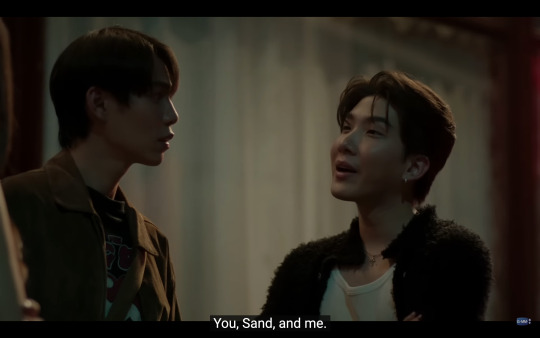
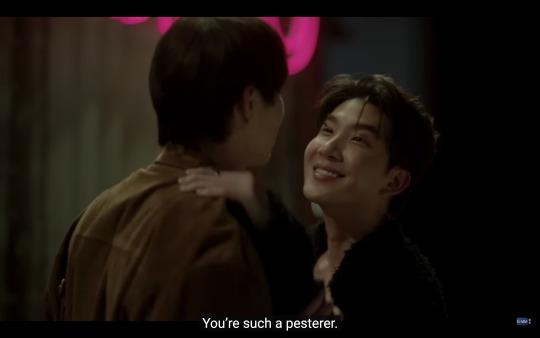
sand he was inviting both of you *so* explicitly what is your move here. sand will complain repeatedly about this into the next scene but no one asked him to cancel his date. baby is in denial
side note ray enjoying begging sand so much?? side note also this is how we find out ray blacked out and sand left him their last night together? ouch
ohhhkay the extensive flirting in the car. "one night stand boy, huh?" sand patently enjoying himself /so/ much but whining the whole way. they are both in trouble and neither of them know it yet but sand is going to find out really soon and ray is not going to find out until they both are in much more trouble
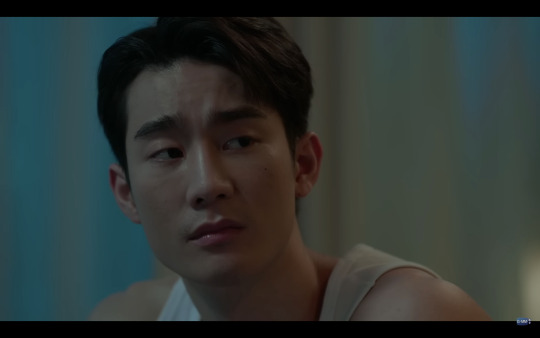
top has trauma-induced insomnia and he's serious enough about it to make this face. I'm still proud of mew for checking if he was trying to pull one on him and then being kind about it when it seemed like he wasn't
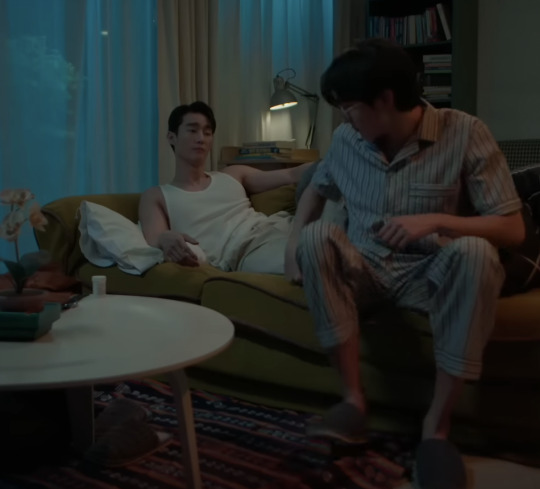
alright tho didn't we just establish that your much comfier bed is right over there? mew no one did this to you but yourself
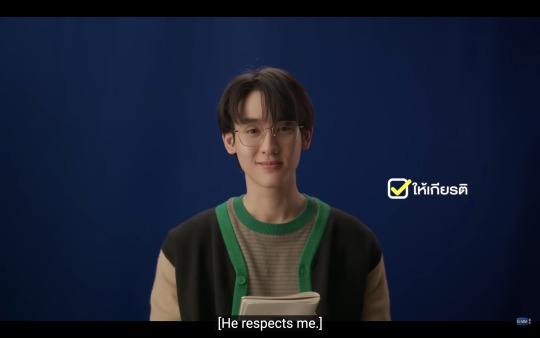
I like these mockumentary cutscenes more than I thought I would. mew silently smirking as he checks off boxes is doing heavy narrative lifting and I'm into it

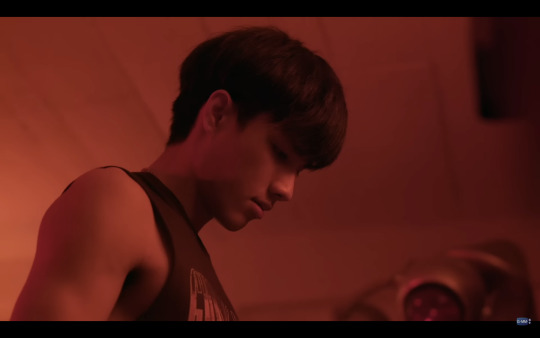
the foreboding music the lighting the lingering on the photo of ray and mew boston what are you planning?? is he about to become a real antagonist? can't decide how I feel about this
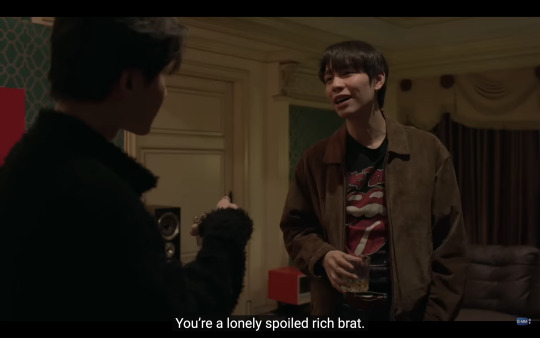
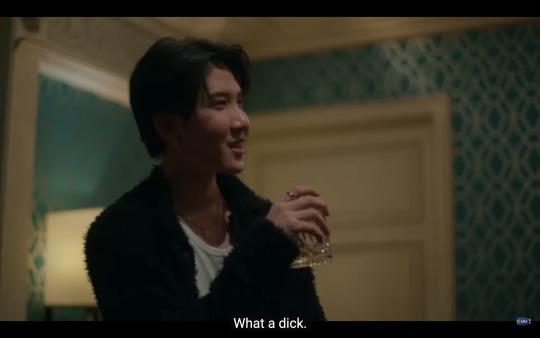
ray is sort of into sand insulting him? is this because he doesn't have the power to hurt him yet or masochistic kink
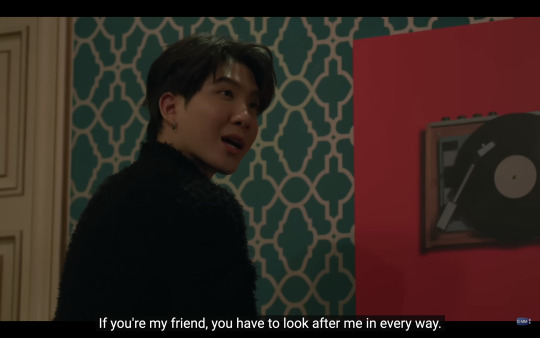
...ray baby no. you're gonna be Learning
sand brings up the /who are you, my dad?/ except this time it's /who am I, your dad?/ convo again and ray makes this face:
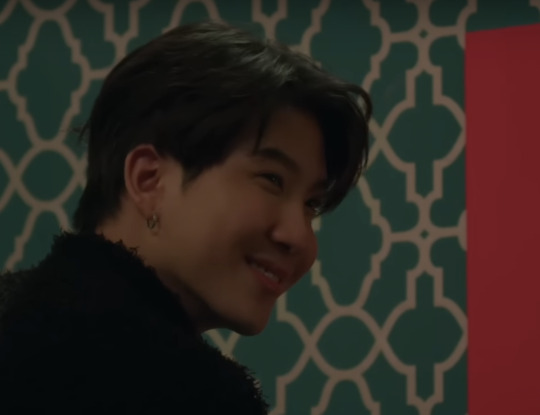
alright
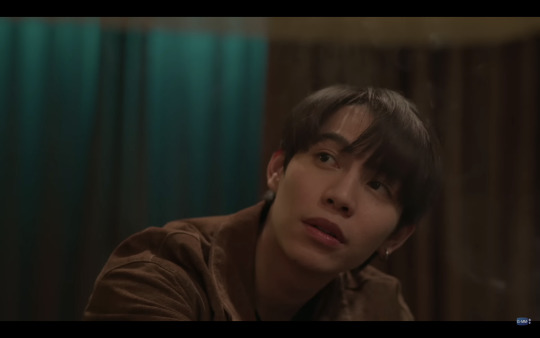
alright

oh here we. fokking go
sand going "what am I supposed to be, your hooker" and ray saying "sure" and sand doing soft surprised pikachu for like ten seconds. ray doubling down and sand telling him to save it. instead of saying "I don't sleep with people for money" he says "I sleep with people I like for free" and we send silent thanks to screenwriters who understand the sex industry and have the cultural vocabulary to write compelling nuanced and still quippy conversations about sex. not to be heterophobic but queer people make better tv
anyway sandray are both playing a game and they both keep getting surprised to be one-upped. this is a very enjoyable dynamic to watch and they seem to be enjoying it too
...for now
at minute 8:30 sand's last vocal sound leaves his mouth. for thirty full seconds ray smokes and asks him leading flirty questions including "am I interesting enough for you?" and "are you open to someone like me?" and for thirty full seconds sand looks from rays right eye to his left eye and back again and lowers and raises his jaw infinitesimally and just generally:

this boy is done for and I can't even be mean about it I'm right there with him
anyway at shortly after minute 9 they break the tension and kiss each other. they kiss each other! ray is the one leaning around from his cigarette to do khaotung's little smoke plume of high art but sand is very much matching him in coming in for this kiss. I love this framing so much. firstkhao have the absolutely ideal dynamic to pull this off*
*if anyone saw that one person copy pasting SANDRAYYYY SWITCHHH into the live comment box the entire end credits that wasn't me but I was there with them in spirit
they break away and sand says if they go further they won't just be friends and ray says some kinds of friendship start from sex you watched the same thing I watched I don't need to describe it but here I am. do you remember though that this was the look ray was giving sand while he said that because ho boy
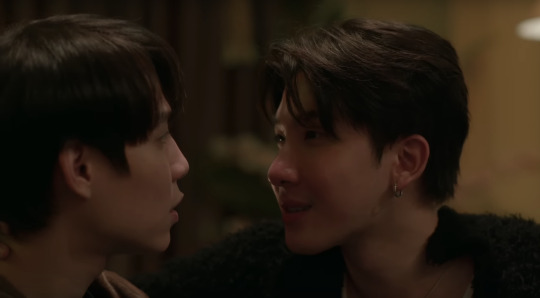
sand pronouncing that ray is going to keep wanting him but they're going to stay just friends right after he says we won't be just friends after this...what level to tackle this on. narratively this definitely feels like foreshadowing and I think he's right on the money on the first bit. but we know that sand is not going to get out of this remotely unscathed whether or not it could possibly be argued that he hasn't already lost that battle. sand showing his hand by contradicting himself out loud as well as internally?
they stub out their cigarettes Significantly and start making out again. can't coherently screencap this scene. it's so excellently done. top notch dynamic again. firstkhao are getting better at this with every go.
ok I do have one minor gripe
for some reason in the middle of sand pushing ray back onto the couch they have inserted a shot of ray on top of sand. it is from the beat that comes after the last little mockumentary cutscene—it's not a double, it's the exact same shot, just colored differently. screenshots below from 10:11 and 11:02
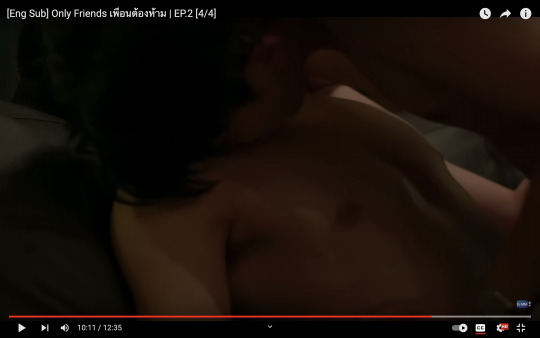

editing mistake? intentional insert to lengthen the scene? I like this shot too but it breaks up the flow of the scene oddly and I want it gone from the first part

mockumentary cutscene: even harder to focus on when I know what's coming back on screen right after but worth mention. obviously sand is reflecting on some past mistakes here. he knows he's playing with fire and he's denying it vocally and also not changing his behavior. self-awareness level relatable honestly. do we think he fell in love with someone he didn't want to? or fell in love freely and then got screwed over? why is he mr. one night stand boy
also don't know whether to credit ray or khaotung for this longest gayest look ever at his own pants. sublime
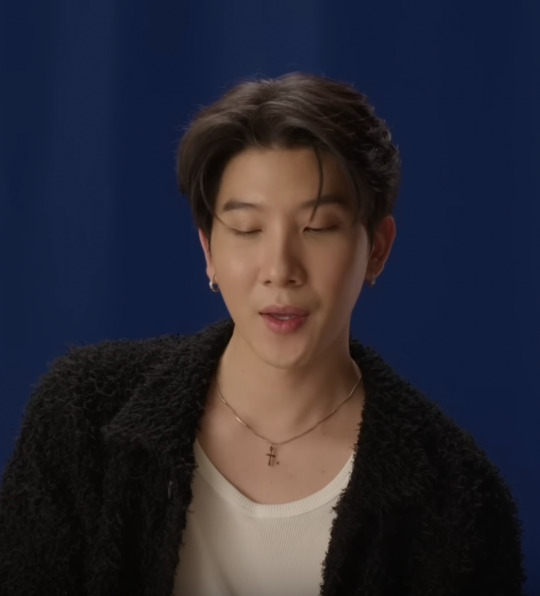
okay back to the couch for our not-quite-ten-second final indulgence. ray's on top this time. I don't even like sex scenes that much I know what I am saying
I see, like sand's, my words are not matching my actions. and yet


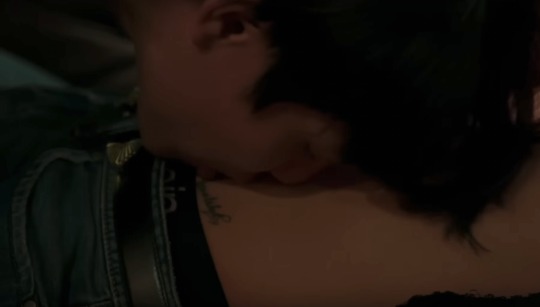
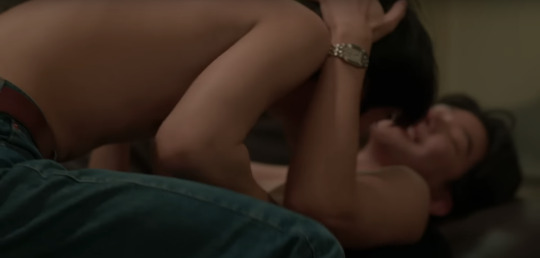
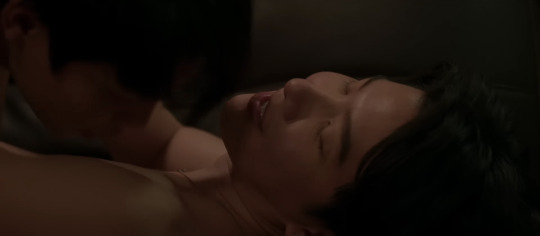


*trembling* sandray.... switch....
all ofts watch throughs
#ofts#only friends the series#ofts meta#firstkhaotung#raysand#sandray#that devolved a little#also it took me so long to finish i took two breaks and posted snippets forgive me#i'm overflowing with um. i don't even know#consider me truly fucked over by this show#where did my saturday go anyhow#ofts watch through
40 notes
·
View notes
Text
“Sunlight over me, no matter what I do.”
This week on what G’s watching - what G’s listening to.
This is exciting!
Gang, I told you content is how I apparently digest my feelings, and a big ol’ part of that is music. Always has been, my dad has this crazy extensive collection of albums. When I was a kid he always had something on in the car, or playing from the old stereo in our living room. One of my favorite memories is listening to the Beatles’ White Album with him on long afternoons. He’d let me dance around on his feet, and we’d sing every single one, I was the eight year old who knew the entire thing by heart.
Music is a core fucking memory for me, it’s my dad in a nutshell. I remember one year for Christmas, he gave me a bunch of burned cd’s - all of the Beatles broken up by time period, Cat Stevens, Bob Dylan, Joni Mitchell, a set of discs that included the top songs broken out by month between 1964 and 1968, six in total. The tracks, he told me eventually, perfectly encapsulated the way those different seasons felt to him - The March/April disc really feels like springtime.
If you knew my dad, you’d know that the effort he put into it was much more than his usual Christmas attempts, which were: my mother buying the gifts and then writing his name on the tag.
So the point is: music can be an incredible thing and it’s a large part of who I am. I could write an entire post about all of that (and one about the Beatles, and one about Paul McCartney specifically, and one about Adele, and one about Bo Burham…see, I’m nuanced) but I won’t. Right now, at least.
Because I want to talk about Fleet Foxes. Specifically, Helplessness Blues.
This album came into my life at a weird time, I’d moved to a new city and was working my first ever real tech job and I was living with my sister, trying to figure my shit out. Which involved coworker-turned-friend drama because at the time I was absolutely not the best person, and it was very early 20’s of me. You know, when everything feels frenetic and you aren’t sure what the fuck you’re supposed to be doing with your life, so you’re just…doing random things, all the things.
Which made me extremely susceptible to the creeping kind of darkness infused with hope the album has. I have a penchant for indie folk bands. I can’t help it. I fucking love guitar and thrumming drums with violins and shit. It just feels real to me. Authentic. Organic.
So it’s no wonder Fleet Foxes pulled me. I had a couple of their other songs on random playlists but had never attempted to listen to their first release. And then one day I was getting my oil changed, sitting in the waiting room and I read a review of Helplessness Blues in a magazine, probably Rolling Stone. I immediately bought it, which wasn’t really like me at the time - I was deep into stitching together random lists on my ipod, pulling tracks from all over the place, but I felt like I had to. Thankfully.
I don’t know what it is about this album, but it’s the perfect mix of mauldin, shiny, twisted, uneasy, exciting, overwhelming. It feels like there’s a story to it, it’s cohesive and purposeful, but I couldn’t tell you what the narrative actually is. And that’s probably the point. It’s whatever the story is to you, and man this album for me is angst and questioning and accepting. It’s become one of those perfect albums you can listen to, never skipping a track, because they’re always a little different depending on the mood you’re in.
And right now, I'm in a weird mood. I’m lost in my life again, and angst sounds about right, so I put the album on this afternoon after I’d finished my unemployment application and tried to harass the pharmacy for my husband, did some laundry, some dishes, random life things. I decided all I wanted to do with my Friday was chill the fuck out, blast Helplessness Blues through my airpods, and just, be with myself, and something familiar. Inside my own brain, but with something comforting, lulling me in the background.
I wanted to wrap myself up in something, and this was the perfect choice. Apparently one of my coping mechanisms is to just put some music on and let it overwhelm me, turning the volume up as high as I can tolerate, and singing along as needed at the top of my lungs. It’s honestly therapeutic.
That’s what Helplessness Blues is good for. Because it’s quite a production. You can get lost in the story and it’ll morph into whatever you need at the time. Today it’s a squirming sense of unease, but also triumph. It’s so good.
I could probably talk about all of the tracks, I’m not going to lie, but that sounds exhausting; they’re still lulling my brain right now and I don’t feel like I could pick out each one well enough, they flow together too well.
However, The Shrine / The Argument is fucking ambitious. It’s so many different things all at once and it’s almost confusing as one song but eventually it’s really, really not. It’s weird and it ends with a horrible cacophony but then delivers really soft and agonizing violins. It has some of my favorite lyrics from the entire album:
In the morning waking up to terrible sunlight / All diffuse like skin abuse the sun is half its size
When you talk you hardly even look in my eyes
In the doorway holding every letter that I wrote / In the driveway pulling away putting on your coat
In the ocean washing off my name from your throat
Because, who hasn’t felt like that? It’s a really specific loss. How else can you say something like that?
This is clearly getting away from me, but that’s okay. This is what I wanted to do today. I don’t do this very often, Helplessness Blues isn’t in my regular rotation, because it deserves to be listened to and I don’t always have that kind of time. I’m thankful that I do today though, I’m almost through my second rotation, and it's helping. I’m updating the story that it is, for me. Next time I listen to it, it’ll remind me of this stupid thing I’m going through and all that I am right now, a little bit.
For example: listening to Blue Spotted Tail was very Crowley and Aziraphale today. That’s apparently where I am, so now it’s part of the story.
Why in the night sky are the lights hung? Why is the earth movin’ around the sun? Floating in the vacuum with no purpose not a one…
Poor little Antony J.
Why is life made only for to end? Why do I do all this waiting then? Why this frightened part of me that's fated to pretend?
So. If you need to feel ways about things (we all do, now and again, right) this album will do it for you. And this is a terrible love letter to it, but just…trust me.
youtube
2 notes
·
View notes
Text
Another soft sad one for you today. Also, I just want to say I see all your lovely comments and I am working on catching up with them. Please keep sharing your thoughts. I love hearing from you all 💜
TW: postpartum depression, discussion of uteruses, intersex discrimination in healthcare, discussion of infertility, discussions of past medical trauma and serious injury (by this I mean talking about the stuff that happened in Unexpected). These conversations are kinda complex and nuanced and so if I miss any trigger warnings or there is something specific you think I should add please let me know.
Master List for this AU here and you can read this one on AO3 here
Stormy Seas
“You have postpartum depression,” the doctor said and Remus felt like he was underwater. He could see Sirius and the doctor talking, and Addie sitting on his lap, but it was all like a pantomime. He was just swimming through the world desperately trying not to drown.
It wasn’t until they were out of the office and past the nurse and through the waiting room that should have been noisy that Remus heard the muffled sounds of Sirius calling his name and finally came up for a breath.
“Yes?” he said. His throat was full of seaweed.
“How are you feeling?”
“I’m fine.”
Sirius knew he was lying but he also knew that Remus knew that Sirius knew that. So it wasn’t going to do them any good for him to point it out. “We can still try a magical doctor if you want.”
“We’re not sure if they’re still looking for me,” Remus said, glancing back down at his leg. “This is safer.”
“Okay, love,” Sirius said and set his hand on the centre console.
Remus took it and felt nothing.
When they got home, Sirius took care of getting Addie out of the car. Remus felt a wave of guilt when he realized he couldn’t remember Sirius taking her from him at the doctor’s office to strap her into the backseat.
“I’m going to see if James and Lily will come over for a bit? Why don’t you run a warm bath for your leg?”
Remus nodded and wandered obediently in the direction of the bathroom, staring at the water running from the faucet for a little too long. He cast a water protection spell over his brace and then climbed in.
He was still sitting there later, long after the water had gone cold and the bubbled had faded, trying to find the energy to get up.
“Remus?” A voice said, “Can I come in?”
And Remus must have said yes because a moment later Lily was beside the tub, holding up a towel as she politely looked away so he could get out.
Remus wrapped it around himself and then sat down on the shower chair they kept for particularly bad moons, or broken legs it seemed. “Can I ask you something, Lily?”
“Of course.”
“How do you feel about having a uterus?”
She looked surprised and Remus immediately felt the seaweed reaching up his throat again, strangling him for talking about things he wasn’t supposed to ask.
“I don’t know,” she said thinking. “I guess the first time I was really aware of it was when I got my first period and I really hated having one then. I hate that people think they can tell me what to do because of it or how I can use it. But it’s going to be the thing that gives James and I some new additions to our family and that makes it kind of hard to hate.”
“You are James are going to have kids?” It was a dumb question really. Lily and James always talked about having kids.
“We’re thinking of trying soon actually. I’m gonna warn you right now I think James is going to try and set our first born up with Addie.”
Remus managed a small smile for her sake more than for his.
“Was there something in particular you wanted to talk about?”
Remus shivered, looking down at his feet that were slowly becoming covered in barnacles, inching his way up his legs, turning them to stone.
“Hold that thought, okay?” Lily said. “I’m going to get you some warm clothes.” She left and came back with some sweatpants, a t-shirt, and a hoodie and turned her back so Remus could change. Somehow this made talking to her easier.
“I didn’t get to choose or I guess I did," Remus started as he got dressed slowly. "I’m sorry, I don’t know how much Sirius told you about me being intersex but there were always conversations about fertility. Even before I knew how babies were made, the doctors were talking about what procedures would give me the best chance at having a kid. They talked a lot about procedures, about which ones would make me look ‘normal’, which ones we should do if I decided I wanted to a girl, which ones made sense if I wanted to be a boy, which ones were easier and therefore should dictate what gender I chose. It was mostly bullshit, but I did have to choose hormones and blockers and then getting off blockers and then surgeries and scans and follow-up procedures.
“I didn't get to choose that I'm intersex, but it always felt like I had to choose this body and what it looked like and how it worked. In the end it didn’t matter. Shortly after Sirius and I got married, I went to see a fertility doctor and they told me I could never carry a viable pregnancy and I felt like the life I chose, expanding Sirius and I’s little family, all went up in smoke and it went up in smoke because of the body I chose.
Remus paused, trying to fight back the ocean that was pouring out of him and the way its salty taste burned, but he couldn't and so he just kept drowning in all his truth. “The only thing I could do was to hate myself. To hate this body for what it took from him. What it took from us. And so my uterus was this broken thing and I kinda stared to believe all the things the bullshit doctors had told me. That because I wasn’t a 'man' or a 'woman,' I was just wrong.
“And then Addie happened and she was just coming out of me and I didn’t have a choice. I - I died. For a moment Sirius and my daughter were right there and I wasn’t. The doctors did what they had to save me so I can’t be mad about that but it meant they made choices about my body. Choices I can’t undo and years of careful planning and decision making were for nothing."
“Since Addie, Sirius and I haven’t had sex. He’s been good about it but I feel like if we did all I’d be able to feel is how hollow I am inside. And I - I don’t want him touching my,” he trailed off, thick tentacles rising from the water to curl around his throat in panic. “He’s going to leave me, isn’t he? I’m not a good husband. I’m not a good father. Maybe they should leave,” he said, even though the thought of Sirius and Addie walking out of his life was like having his still beating heart ripped from his chest. Still, if it meant they’d be happy...
“Remus,” Lily said gently, as she turned around and made her way over to him. She sat in front of him and laid one hand on his leg. Her soft fingers touching all the barnacles and brine that were calling him to the ocean floor. “He isn’t going to leave you.”
But Remus couldn’t hear her. His mind was stuck on every part of him he wouldn’t let Sirius touch and the realization that he thought if Sirius did, he’d end up bleeding out all over again. And he realized for the first time in six months that he had died. He had been dead. “I think I’m going to be sick,” Remus said and got up and lurched in the direction of the toilet before emptying what little he had to eat that morning and then leaned against the wall next to it, shivering.
Lily got a cloth and cleaned his face up.
“I don’t want to die again,” Remus whispered.
Lily froze, the cloth stilling on Remus’s cheek for a moment.
“Do you think it would be bad for me to see Addie now?”
“Why would it be bad?” Lily asked.
“I read somewhere that even if a parent fakes being happy a baby can tell in the dilation of the parents eyes and that impacts their development. I don’t want to hurt her with this.”
“Oh Remus,” Lily said, giving him a kiss on the forehead. “You aren’t going to.”
“I’m sorry,” Remus mumbled as he tried to get his tears under control. “Don’t tell Sirius please."
She hesitated before nodding and then helped him brush his teeth and get some water before letting him know that Addie was down for her nap if he wanted to go and see her.
Remus went and kneeled in front of the crib. Vaguely aware of the way that he was mirroring what Sirius had done when she was sick. She looked so small and deep down Remus knew he was scared, but it had just been so hard to feel it lately. She was so tiny and yet she’d grown so much.
He wasn’t sure how long he’d been sitting there when Sirius came down and sat next to him. “Hi,” Sirius said, resting his head on his shoulder. “You could have come and seen her when we were having lunch.”
Remus kept his eyes forward. “It’s easier this way.”
“Because then you don’t have to worry about hurting her?”
Remus sighed. “Lily really sucks at keeping secrets.”
“Lots of people have postpartum depression and don’t fuck up their kids, Remus.”
“I know, but my dad had a hard time accepting me at the start. No one ever told me about it until he got sick. I was sitting at his bed one day and he just started crying and apologizing for all the time he wasted and the second he started talking about it aloud I could feel this weight inside of me, this grudge, I didn’t even know I had been holding. I never want Addie to feel that way about me.”
“So we’ll talk to her about it,” Sirius said, resting a hand on Remus’s knee. “We’ll tell her the truth about how she came into this world and how hard it was on your body and your mind and if there were things you didn't do with her it wasn’t because you didn’t want to, it was because you couldn’t.”
Remus nodded slowly, unsure of a way to craft that story to a child that wouldn’t leave them wracked with guilt.
“Do you regret having her?” Sirius asked, and his voice was quiet, much quieter than it needed to be to avoid waking Addie.
Remus looked at her little body, splayed out and bundled in her duckie onesie. Beans' leg clutched tightly in one hand. Her hands were always like that, clenched in fists as if she came out fighting. “I love her and I’m glad that she’s here, but I died having her and if I hadn’t had come back… I don’t know if trading one life for another is worth it.”
“I don’t know what I would have done if you hadn’t come back to me. The whole time I was waiting to hear I just kept looking at her eyes and wondering if I’d ever get to see yours again.”
Remus rested his head on top of Sirius’s. “I don’t know how to both love her and hate the way she came into this world.”
Sirius just took his hand and sat with him silently for a moment.
“Did Lily tell you everything we talked about?”
“I think some things she just gave me the gist of. I get that she may not be able to keep a secret, but I think she can at least understand that there are some things I needed to hear from you.”
Remus sighed and closed his eyes. “I’m scared if we have sex that something bad is going to happen to me again.”
“We don’t have to,” Sirius said, as he switched to massaging Remus’s fingers and the palm of his hand. “Only when you’re ready and only whatever you are comfortable with.”
“And if I’m never ready?”
Remus felt Sirius shrug against him as if it was the easiest decision in the world. “Your mental and physical safety is worth more than that.”
“And my depression, what if that never gets better?”
Sirius paused for a moment, choosing his next words carefully. “I know it might feel that way right now but we haven’t started the medication yet and the doctor also recommended speaking to someone. I think we have to hope that the treatment plan could work. Even if it might not ‘cure’ you, it could hopefully make it more manageable. And if it doesn’t work at all, then we try something new. Then it is just something we learn to live with like your lycanthropy or my nightmares or the sudden presence of a child in our life.”
Remus could feel the barnacles cracking but he wasn't quite sure he was ready to come back to shore. “I’m scared Sirius. All the time.”
“Then maybe it’s time we accept that this isn’t something we’re going to magically be able to do on our own.”
Remus took Sirius’s hand from his and started to trace over the lines on his palm. “Would it be okay if I called my mom? Maybe she’d want to stay for a bit.”
Sirius smiled. “I think that would be wonderful and maybe the Potters can come for a longer visit too?”
“Maybe we can find somewhere we could all stay for a little while, just to get away from everything. James and Lily could come too if you wanted.”
“And Reg?”
“And Reg. It could be like a little family get away." Their island in the middle of the storm.
“Only if you promise to actually let them help and not feel like you have to act like some sort of gracious host the whole time.”
“I promise. That’s one trait I never want to pass onto our daughter," Remus said as he looked at the seaweed he'd spilled all over the floor. "I hope she becomes the best parts of us.”
“Of all of us,” Sirius said.
Remus managed a small smile, pushing out the saltwater for something sweeter. “But as soon as she’s old enough I’m gonna teach her how to keep a secret.”
“Remus, I thought we agreed we’d already have enough trouble raising the child of two Marauders without teaching her how to lie to us.”
“It’s not lying," Remus argued. "It’s just withholding information.” And even if Remus couldn’t see his face, he knew Sirius was rolling his eyes at him in mock exasperation. He wondered if Addie would learn that look from him.
The two of them watched as Addie stretched, smacking her lips lazily before wiggling her way back to sleep. A single drop of drool dripping down her chubby baby cheeks.
“I’m never going to leave you Remus.”
“Promise?”
Sirius’s head wiggled against his as he nodded.
“Can you say it?”
“I promise. You two are my family. I’m never leaving you. My home is always wherever you’ll be."
And while Remus might have not been fully afloat again, he felt a little less like he was going to drown.
35 notes
·
View notes
Text
chimpoozle's Maison Ikkoku Facts #1 - Godai's Remark
Maison Ikkoku by Rumiko Takahashi is one of my favorite manga\anime of all time, if not my #1 favorite. And now that I am here on tumblr I will use it as an outlet to share things I find interesting about this series that I expect most people don't know. Since this is the first post in this series of posts I will start at chapter 1 of the manga, with an examination of a speech bubble whose nuance and context have been lost amid their travels through the barriers of language, culture, and time.
6 pages deep into the very first chapter of Maison Ikkoku, we (and the rest of the cast) have just met Kyoko Otonashi for the first time when she unexpectedly appears and announces that the previous manager of the main setting's boarding house has retired and she will be moving in and taking over as the new manager. It is clear from this first interaction that our protagonist Godai is feeling some kind of way towards Kyoko from the outset.
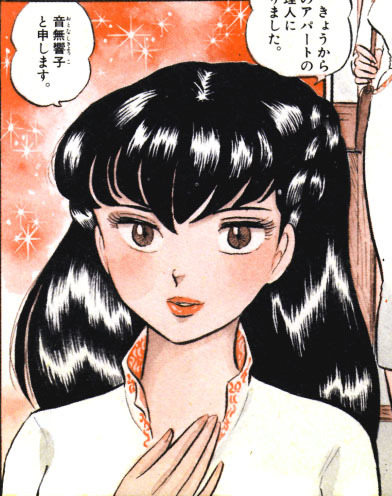
Below in Japanese is the scene I want to discuss:
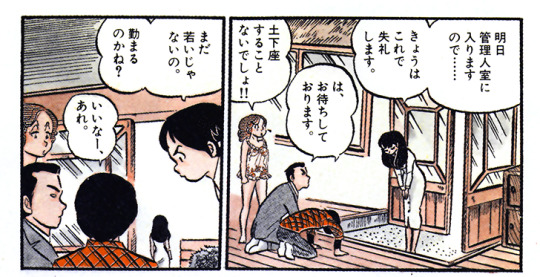
Kyoko: 明日管理人室に入りますので.......きょうはこれで失礼します. Yotsuya: は, お待ちしております. Akemi: 土下座することないでしょ!!
Ichinose: まだ若いじゃないの.勤まるのかね?
Godai: いいなー,あれ.
Rough\literal English translation: Kyoko: Tomorrow I'll be moving into the manager's room, so please excuse me for today. Yotsuya and Godai: (extremely formal and polite) We will await your return.
Akemi: "You don't need to get down on your knees over it!!" Ichinose: "Isn't she still quite young? Do you think she's up to it?" Godai (watching Kyoko leave): "Nice...."
The line in question is the last one: Godai's "いいなー,あれ." To break this short utterance down:
いい = "ii" = Good/Nice/Attractive/Something you like なー = "naa" = A sound you stick on the end of a sentence or comment when you are just musing to yourself and not seeking approval or agreement from the listener. あれ" = "are" = "that"
いいなー together is a commonly used expression to indicate that you like something and you wish you had it, especially if you are jealous that somebody else has it. If somebody shows you their new car and you say いいなー! It means "nice! \ It's so nice! \ Lucky you! \ I wish I had that! \ I'm jealous!"
As you can hopefully see, it is fine to make this statement when you are talking about an object, but when you direct it towards a human it sounds like a crude objectification akin to ogling someone and saying "nice. I want that." In fact he does call her "あれ" which = "that." It isn't a great look for our protagonist Godai whom we have only just met.
Let us look then at the original English translation of this line translated by convicted felon Gerard Jones and see how it was handled:
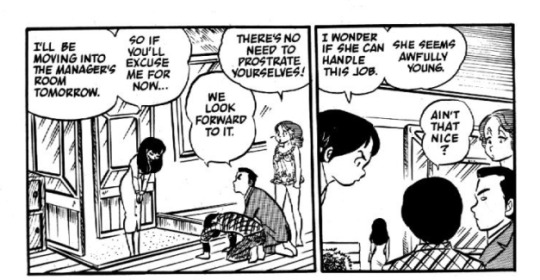
Here Godai's remark becomes "ain't that nice?" and I suppose it somewhat retains the feeling a skeevy, lecherous, ogle. I don't love this translation, but it's ok based on the Japanese. But there is also a brand new Viz translation of Maison Ikkoku which is so new that it (at the time of writing) still has 1 volume left to be published. So let's see what they went with for this line:

Here Godai's line has been significantly softened to "she's so pretty..." I would say that in this translation he escapes without looking like too much of a perv.
So which of these two English translations better conveys the nuance of the original Japanese? Well it is actually a bit more complicated than just a simple answer, because we are missing important context for this line that was known to the readers who were there when it was first published.
Maison Ikkoku chapter 1 was serialized in the debut issue of Big Comic Spirits (November, 1980 on the cover date, published in mid-October 1980.) If you lived in Japan in October of 1980 and read this chapter, you would be aware that Godai's line, "いいなー,あれ," is a reference to a series of currently-running television commercials advertising the Yamaha Towny Moped.
In these commercials, the owner of a parked Towny would return to find some stranger gawking over their bike who will then enviously get into a conversation with them regarding how いい it is. As the owner hops on the bike and rides away, the on-looker will say to themselves "いいな,あれ" as they watch them drive off into the distance. Just as Godai is watching Kyoko walk off into the distance from behind. Here is one such commercial on youtube:
youtube
Looking at this youtube upload now, I notice there is a 2 year old comment from someone mentioning this panel in Maison Ikkoku chapter 1, and how this seems to be the inspiration for that line. Many of the other comments mention how famous or nostalgic these commercials were, with one commenter saying he still uses "いいなー,あれ" to this day. Further down the page someone mentions the ad is parodied in volume 1 of Kariage-kun, a famous gag manga, which is another indication of how well-known this ad campaign was to people living in Japan at the time. You are meant to hear Godai speak this line in your mind with the same intonation as the on-looker in this commercial.
And for that reason, I would rather give Godai the benefit of the doubt for this comment that the new Viz English translation gives him. Perhaps even in-universe he is referencing these moped ads.
Unfortunately for him, even in Japan young people no longer remember this ad campaign, and Godai is doomed for eternity to be condemned by young readers as a lecherous, ogling, womanizing, perv just a handful of pages into reading this manga.
5 notes
·
View notes
Note
Lbr it's probably why these men love Johnny cause he'd be more "relatable" for not being there for his son.
there certainly are corners of the interwebs that love Johnny for all the traits that make him toxic towards himself and others (and not in the "that's an interesting character" kind of way, more as a "I wish to model myself on this/am like this" kind of way), and I wouldn't be surprised to add this to the list.
at some point I'll get to write my opinion about toxic masculinity in fiction and its limitations (or, the unintentional cyclical glorification of toxic masculinity in text that's ostensibly trying to do the opposite - what was that post about people completely missing the point of fight club?) but in the interim, it is fascinating that - while there are problems in the way that Johnny is written in terms of... shall we say nuance? (but look, it's a karate soap, it's not idk, raging bull, it's not attempting to muse, it's attempting to drama) - I do believe there is a sincere wish to move him away from that kind of behaviour. that is - we assume - his arc.
I suppose the question is: if there is a wish to appeal to that kind of an audience, how much will that affect the writing of the show?
Johnny cannot be written as someone who turns his life around and becomes a better man, while still embodying the kind of reductive traits that certain audiences glorify as "booze, babes, and fast cars" (even though the last two of those aren't even??? what's written??? and the first is alcoholism)
I think two examples of this disconnect are:
a. his relationship with Carmen not expecting him to change some very fundamentally unhealthy parts of himself - he just "has a girlfriend" which isn't really a character trait in and of itself. He gets to have a girlfriend as a reward for being good to Miguel, because "having a girlfriend" is meant to signify that he's doing better.
b. the flip-flopping on relating to kids. the use of modern intersectional feminist language, only to turn around and denigrate it, this especially evidenced in ways he's talked to girls who use this kind of language (Aisha and Devon - also Moon and Piper but not to their faces)
None of these are indicative of the fact that he won't commit in future. I'm cautiously excited for what Devon Lee might bring to the table. I also think his crying in front of Miguel while incredibly drunk and having wet himself was the most pathetic we've seen him on this show. As for his relationship to Carmen... *sigh* ok, that one I really don't know
that's what fanfiction is for right?
What I guess I'm saying much too late at night is: at some point you've gotta commit to a point of view. your outdated sexist, racist uncle isn't really the same as teenagers (several of whom are girls, queer, and people of colour) who are trying to find a world that can accept them as they are. I'm not saying "Johnny learns all the Language" (although he clearly can - ADHD vibesss), I'm just saying there's a tightrope happening here and it's not always successful, but I appreciate the attempt - and I appreciate the limitations (artistically, but I imagine also with ratings and producers and and...)
I wonder if those same men sneered at someone like Devon being introduced with extreme disdain for the death penalty and giving her pronouns?
#johnny lawrence#ck#cobra kai#long post#apologies for the ramble it really is late for me and i may have said something odd here#i dont - by the way - make any assumptions on devon moving forwards i feel like im putting a lot of pressure on that character#when she'll likely be secondary/tertiary - but it is interesting to think about... like do they skip past those bits?#the teenagers aren't always as successfully written as the adults in my opinion#however i think s4 made me more interested in most of them: miguel - sam - tory - robby especially#grounding them necessitates taking that language seriously? and again - i kind of think they do - but limitations to Understanding It#(maybe what I'm really saying is they should get in some young queer writers)#i shouldnt post things this late - cest la vie my guys
12 notes
·
View notes
Note
I have a PR question. How do we know if a non-paparazzi photo is staged/arranged or not? I’m talking about random pictures someone takes of him and his supposed dates. ☺️
I don’t think you can know for sure, Nonny. That’s kind of the beauty of it 😊
If you’re interested in joining today’s class and read a little more about stuff, click below.
Disclaimer 1) I really shouldn’t be any kind of authority in terms of pr and of famous people pr but since many people here are presenting things as true statements without knowing anything about anything, it’s only fair that I tried to explain some stuff while knowing, like 5% of stuff.
Disclamer 2) I’m not really interested about talking specifically about Timmy’s situation. His dating life is either a private thing that shouldn’t be commented as a public topic or a pr thing that I don’t want to encourage it by commenting. Or both and see all of the above.
What I’m interested in, is talking about pr strategy and public images in general ways, why it’s there and how it works and that’s about it.
That being said, let’s start today’s class.
My belief when it comes to pr and related stuff is that knowing the ‘truth’ is less important than having as much knowledge as possible on the subject. It’s kind like math. If you have an equation and someone gives you the answer but you don’t know how to get to there yourself, knowing the answer doesn’t get you much. But if you have all the keys to resolve the equation, you can try to find the answer on your own. And, even if you don’t find the answer, knowledge will help you understand the logic of it. Why it’s there. What it says.
So what’s our equation today? A content of one (or more) public person/people taken from a smartphone camera of someone we don’t know.
Smartphone content isn’t inconsequential. Using ‘low’ quality camera instead of a professional one says something different. It’s supposed to bring more authenticity, closeness to the audience, spontaneity. It feels truer because you could be the one taken it, since there is a large chance you own a smartphone when you probably don’t own a professional camera. It has to be genuine if you could be the one taking it, right? You would have any interest in taking part of something fake, wouldn’t you?
It can feels logical like everybody knows that or it’s not really important but it’s something that is actually thought through by professionals when it comes to create content. There is that brand of cooking videos (you know the one you stumble on when you remember Facebook exist and that show you recipe that always look really easy to make at home and delicious (and also overly greasy and/or overly sugary) that was explaining how they could totally shot their videos in professional kitchen with high quality stuff but choose to do the complete opposite instead? Because their goal is to make their audience feel like they can make the recipe at home so they shot their videos on small kitchen with smartphones.
Creating professional content on un-professional devices is a real thing. Half of the business of influencers people is built on this. To think that the strategy has stayed only in the influencers people business would be very naive. In the famous people world, content created on smartphone is used for these bts vibes. We’re showing you what you’re not supposed to see so you feel like a part of it. This is how the famous people you love are in real life, when the camera is off. Except they’re not off, since you’re seeing it.
You’re not part of it, we’re showing you just enough for you to want it, to envy it but you’re not.
Let’s go back to the casual pic of that public person. Truth is, you could be taking the picture yourself and still don’t know what you’ve taken.
Say I’m well known top model who has signed a new contract with a clothing brand. I have pap walks to put the clothes in online articles and magazines. Of course pap pics also ends up on social media but they aren’t the type of media design for the platform. Pap walks create some distance from the audience because they often looks like real photo shootings. Part of the audience is defiant towards it. Either it’s an invasion of privacy or it’s staged. It’s not that positive.
What’s positive is me going out in my brand new clothes and cross path with people who recognize me. They wouldn’t know anything about my contract but would do all the job themselves without knowing they’re doing it. They would take a picture from afar, maybe a selfie, share it on social media with a cute context. A story. Write about that cute dress I was wearing, what my coffee order was (omg, she likes almond milk like me!), what’s the interaction was like. Was it staged? I like that dress and I really wanted to go for a walk and for that cup of coffee. And the fan was nice, everything was genuine. Yet, I still went out to be seen and the clothing brand is happy.
The problem with that scenario is that I’m not in control of anything. Maybe nobody will recognize me or care enough to take a picture or something went wrong with the fan/person I’ve seen and instead of a cute story I have someone insulting me all over the internet. Lot of time lost, some risk taken, not much result. Wouldn’t be easier to take a friend or a PA who would snap a few pictures and we’ll be home in 5 minutes, job done? Pr team get the pics and share them with the world with one of the twelve stan accounts about me they’ve been running for years. Even write a little story to go with it if they’re inspired enough. If you think it’s too much, you’re naive. Everything that can be faked or staged to save time, money or give you more control of the result, has already been faked and staged by someone. Multiple someones.
My take on this would be, the bigger you are, the more money you have to carry on your shoulders, the less you let things to chance and the more you take control of your narrative. PAs, agents, PR people,… When you have a whole team around you, you don’t (overly) pay them as secretaries. They’re not just here to handle your planning and bring you coffee or you would only need one person, not 7 of them walking around you all the time.
But what if there is no contract? What if I’m just wearing that dress because I like the brand? Or maybe there is a commercial deal with the brand but I have no obligation to wear it on my daily life or been seen with it. Wouldn’t the pics look exactly the same to an outside eye?
Of course I can go low key, move only inside cars with tinted windows, don’t walk around in popular places and only go in isolated, private places. I can. But maybe sometimes I’m tired of it. Maybe I just want to meet my non-famous friends where they like to go and fuck it if I’m seen there. Pics taken by people would look like they’re staged. Except maybe they’re not.
But if I stop caring, I indirectly accept that however I’m seen becomes part of my public image. And if it has become part of my public image, I should accept that it will be monitored to some extend by my team, and eventually by myself.
So how do we find the answer? We can’t. Based on a single photo alone, I don’t think we can. Unless you’ve seen contracts or you know the person personally, you can’t really pretend what’s going on being doors. Even so, would you know everything? Sometimes a contract is just a contract. Something a commercial deal is also a friendship. Sometimes a real friendship became public et become part of your public image. Sometimes you don’t really feel like talking about commercial deals with that cousin you’re seeing 5 times a year and doesn’t really care about what the details of your fucked-up public job are. So even your own family doesn’t know the truth about everything.
What we can do, if we’re interested in doing it, is look at every piece of content and ask ourselves. What are we seeing? How is it made? For what purpose? How that type of content is used in different contexts?
With more context, you can make interpretations for yourself. Will everybody will have the same? Of course not. Mathematicians, physicists, chemists, spent their time disagreeing on interpretations of stuff, how can we expect people to agree on the interpretation on something based of human behavior?
From what I’m seeing, PR conversations seem to be going on in many (many) fandoms. From a PR point of view, I don’t think it’s not a bad thing, whether what we’re talking about is real or fake in the first place. Having people think it’s fake and people think it’s real makes the conversation going. They’re always be people who would want to defend their point of view, their opinions, their favorite celebrities. Names will keep being mentioned, pics shared, word spread. SEO (Search Engine Optimization) and algorithms are happy.
My best advices, I guess, is, first, remember that you aren't obligated to have opinions on everything or to care about every aspect of the life of an artist you love, even when media and people would like you to think you are and you should. There is even things, such as dating life of other people than yourself, you shouldn’t really have opinions about at all.
If romance, love and sex keeps getting used to sell, it’s because it works. Think about all the books, all the movies, all the stories where a love story is integrated in an action movie/horror story/sci-fi scenario even when it has nothing to do with anything. Romance/love/sex sells since forever and probably for a long time. Because most people think falling in love is the main purpose of life and the most important thing in the world.
My second advice would be, don’t be naive but don’t be cynical either. Contexts and nuances are always important.
Anyways, like always I don’t have an answer and I’m barely even interested in the answer but I hope I'm able bring some perspectives to things because it’s important. More than ever, content is a tool. Since everyone is part of an audience, if not potentially part of all audiences , we should all learn more about how the tool works.
Of course i'm joking about the concept of class. I'm not a teacher. I'm only sharing some personal knowledge and opinions. I can be wrong or contested. No hard feelings against anyone.
41 notes
·
View notes
Note
hi ally! number 20 for the intimacy prompts for david and patrick?
20. a hand written note
Read on Ao3
I’m feeling like a half me
David putters around the store after closing, rearranging the products so they’re all facing out the same direction, dusting the displays and marble mortar bowls that sit on the higher shelves. He takes his time, working through the closing procedures with care and balancing the till two or three times before David is convinced he got it on the mark.
Winter hit David just as hard as it hit Schitt’s Creek this year. The dark days brought a slow pace and the chill ever-present chill didn’t help either. He does have a support system - Patrick, Stevie, his family, even the Brewers by extension - but there’s a distinct difference between being alone and feeling lonely. David knew that feeling all too well during the last few months he lived in New York.
He just never said anything outright.
Once everything is accounted for, David ducks into the back room to grab his things. He wraps himself up in his scarf, a soft, lovely cashmere they now carry because apparently the cat hair scarves were aiming for too narrow of a market to gain any profit. That, and the fact that too many people were allergic (”It’s just a lawsuit waiting to happen, David.”).
As he pulls his coat off the hook on the wall, a flash of bright yellow catches David’s eye. It must have slipped from his coat pocket, but he rarely uses sticky notes. That’s more Patrick’s thing.
He shrugs and unfolds the small square of paper. His shoulders relax upon seeing the scrawl.
Made you look.
It even has a little smiley face. David shakes his head even though he’s alone, even though his unrelenting husband is a few miles away and knows exactly what to do to make David smile even just a bit.
He tucks it back into his pocket, making a mental note to tape it into his commonplace book before bed, and heads out the door with his bag in hand.
The drive home is as uneventful as ever, minus the light snowfall on this mid-January evening. The knot in David’s chest tightens as he comes up on the motel. He thinks about stopping in for a split second just to say hello to Stevie and maybe see if she wants to tag along for dinner, but remembers just in time that she’s in Wisconsin for the week and decides against it.
But David finds himself parking in front of his family’s old bank of rooms anyway, headlights flooding the now empty window boxes. He sits in silence, the engine of the boat of a Lincoln he’s driving humming around him. Slowly, he runs a hand over the dashboard like he’s caressing the physical memory of his family and the few years they lived in those two tiny rooms.
He wouldn’t give it up for anything, even if privacy was hard to come by at times. David still aches heavily, still misses them even over a year after they’ve all left. And it isn’t like they left him behind, he chose to stay, happily. They still visit, Alexis more so than their parents because she has the leniency, and they talk more now than prior to their fall from grace, but that doesn’t change the fact that he wishes he could just pop in and see them all.
David sighs and glances at the bright No Vacancy sign in the office window, the No still out even though Stevie has told him they funds to fix it. It’s just one of little nuance he cherishes about this place. He supposes, in a way, it just gives the Rosebud more character.
Not wanting to idle any longer, and seeing Roland’s truck three spots away from his and really not wanting to get caught in a conversation with him tonight, David reverses and heads home. Patrick’s probably waiting for him, hopefully with a fire going and dinner ready.
He’s home before he realizes, sort of driving on auto pilot for that stretch of ten minutes until, suddenly, he’s parking in the driveway. David shuts the car off and sits in the total silence for a long moment before he find the energy to walk. He feels dead-tired from being on his feet all day and from several weeks of a slumping mood.
A gust of wind bites at his exposed cheeks as David makes his way to the front door, careful not to slip on two-day-old snow that’s become slick with the falling temperature. Just as he reaches for the handle, prematurely embracing the warmth of their home, David is stopped in his tracks as yet another yellow square sticky note greets him on the door.
Welcome home, baby. Dinner on the couch and a movie tonight. I love you - P
David is, of course, smiling a little wider as he steps through the front door. The smell of spices and onions float in from the kitchen. David toes off his shoes, hangs up his coat beside Patrick’s in the closet - but not before digging the other note out of his pocket - and drops his bag by the staircase.
He finds his husband in the kitchen, humming and swaying around to one of his folky rock playlists as he stirs something delicious in a large pot. David leans into the door jamb and observes this private moment until Patrick catches him, mid-turn, as he reaches the fridge.
“Hi.”
“Hi.” David steps further into the kitchen, slumping against the island. “I saw your note.”
Patrick grins as he pulls out a tub of sour cream. “Yeah? Which one?”
“Both of them.” David holds up the two pieces of yellow paper. “Made me smile.”
Patrick pries the off the plastic lid and sets it aside. “Good. Seeing you smile makes my day.” He comes around to David’s side of the island, then, eyes wide and gentle despite the slight earnestness in them. “You’ve seemed kind of down recently. Quite, too.”
David shrugs. “It’s the winter,” he replies honestly. “It just happens.”
And Patrick - wonderful, understanding Patrick - doesn’t press further, because he knows David wouldn’t be able to handle the questions right now even though he means well. Instead, he steps even closer, takes David’s face in his hands and kisses the corner of his mouth. “I missed your smile.” And when David’s lips pull of their own volition, Patrick adds a soft, “There it is,” smiling, too.
He encourages David to change into something more comfortable and to meet him in the living room. He finds Patrick ready and waiting with two bowls of turkey chili topped with sour cream. He kisses David soundly as they settle in for the evening, a selection of movies queued-up for them to choose from.
Before bed that night, after he puts both notes into his little journal amongst theatre tickets, newspaper clippings, and quotes, David takes a page out of Patrick’s book. He locates the stack of sticky notes he keeps on their desk and peels one off.
Thank you for today. Thank you for being patient. Thank you for loving me through it.
David sets it on Patrick’s toothbrush where he’ll easily find it. And when he does, he slips under the covers with minty breath and a knowing look, pulling David into his side.
If he snuggles a little closer to Patrick that evening, then that’s all there is to know.
#prompt fill#david x patrick#sc fic#sc ficlet#schitt's creek fic#schitt's creek#david x patrick fic#my writing#sometimes you just have to project into your writing#actually...all the time
41 notes
·
View notes
Text
𝐋𝐎𝐑𝐄 𝐌𝐄𝐌𝐄: 𝑷𝑶𝑾𝑬𝑹𝑺 𝑨𝑵𝑫 𝑨𝑩𝑰𝑳𝑰𝑻𝑰𝑬𝑺
a series of questions for any muse with superhuman, psychic, supernatural or otherwise enhanced powers and abilities
created by me! | tagging @teletropic / @unvincibled @shinedied @thunderbringer & whoever else would like to do this!

01. what are your muse’s powers, and where do they come from?
tandy’s abilities can be divided into two categories: manipulation of ‘living light’, and touch telepathy.
lightforce: tandy is a human host to ‘lightforce’, a mysterious energy force of unknown origins. this grants her the ability to generate and wield a kind of ‘living light’, which she can manipulate into various forms and shapes, including the daggers that give her her name. tandy can create weapons, energy blasts, shields and use it to fly. she can also manipulate other forms of light, and affect electrical fields. lightforce can purge a body of malignant substances, such as drugs or poisons. it can also heat up and cut through any substance on earth. it appears as either pure white, or with a slight golden glow from tandy’s eyes and skin. lightforce allows tandy to pass safely through the dark dimension without being consumed.
( this is just a personal headcanon, but I strongly believe that tandy’s light is the same substance that ego and peter quill wield in guardians of the galaxy 2. visually the substances are near-identical, both can be manipulated into different shapes, and it would make sense as they exist in the same universe. )
telepathy: tandy also has psychic abilities, accessed primarily via touch. initially she is only able to see people’s hopes, but this develops into fully-fledged telepathy as her abilities develop. she sees people’s thoughts visually, rather than as sentence fragments. she is also able to sense other psychics, and is an intensely powerful draw for other psychic entities and demonic forces.
you can find out more about tandy’s powers here and here!
02. how old was your muse when they gained their powers? at what age did they start using them?
tandy was born as a predestined part of the divine pairing, one half of a mythological duo destined to save new orleans. this granted her psychic abilities, but these did not emerge until much later. she was eight years old when she was exposed to lightforce, but again, this lay dormant in her body until her teenage years. at the age of sixteen tandy came into contact with tyrone johnson, the other half of the divine pairing and the possessor of darkforce, which triggered her psychic and light-based abilities.
03. do your muse’s powers affect their everyday life? if yes, how so?
initially, tandy struggled to control the minor effects of her abilities. her lightforce can influence electrical fields, and when tandy is experiencing strong emotions she will inadvertently damage these- for example, blowing out lights, setting off car alarms, or otherwise damaging electrical equipment.
conversely, if someone else is experiencing strong emotions and tandy happens to touch them, she will likely become sucked into their thoughts. when she first begins using her abilities, she is unable to control her touch-telepathy, but with practise is mostly able to avoid reading minds. it never becomes too big of a problem, as tandy mostly avoids touching people anyway.
04. does your muse actively try to help others by using their abilities? if not, why not?
yes- try being the operative word. most of tandy’s efforts to play superhero in her teenage years end in disaster. because her abilities are inherently destructive, she struggles to help in emotionally complex or nuanced situations. for example, one of her first attempts to play hero sees her beating up an abusive man and trashing his home in order to get him to leave his abused girlfriend. unfortunately, this backfires- the girlfriend feels bad for him and insists on staying with him. in short, tandy is the person you call to beat up a drug lord, not to negotiate the end of your marriage.

05. do other people know that your muse has powers? if so, who?
yes, a multiple people are aware that tandy has abilities. tyrone, of course, is aware of her powers, as his presence triggered them. her mother is also aware, after tandy saved her from a roxxon assassin. tandy is not particularly shy about demonstrating she has powers, whether it’s to threaten her enemies or save her friends. however, after her run-in with andre deschaine, she is far more careful about revealing herself.
06. what are the downsides of having these abilities? would your muse give them up, if it were possible?
there are plenty of downsides to tandy’s abilties. as we have seen, she sometimes struggles to control them. they are also very violent- especially her daggers- which puts the onus of fighting and killing onto tandy rather than tyrone. the weight of expectation of being part of the divine pairing is also tough- the female half is supposed to be hyper-feminine, nurturing, self-sacrificial and loving... all of which tandy struggles with. her lightforce and status makes her a target for demons from the dark dimension, all of whom which to entrap and feed on her endless light to enhance their own powers. nonetheless, tandy would not give up her powers- she has had them for too long to feel safe without them.
07. does your muse have a ‘kryptonite’- an innate weakness built into their power set? what is it?
darkforce neutralises tandy’s lightforce, and vice-versa. she is also susceptible to psychic attacks, though is getting better at repelling them.
08. do your muse’s powers evolve or change over time, or are they static? can they become more powerful?
tandy grows more powerful with time. initially, she is only able to create daggers with her lightforce, and can only see people’s hopes through touch. as she explores her powers further, she finds she can create other weapons with light, influence electricity, and develops full touch-telepathy. in adulthood, she masters flight. tandy is capable of impressive feats at full power, such as providing light for the entirety of new york city when the dark dimension attempts to consume it.
09. if your muse could have a different power or ability, what would it be and why?
tandy would love tyrone’s ability of teleporting! she is also slightly jealous of his role in the divine pairing, which she feels she could fit into more easily.
#𝒄𝒉𝒂𝒓𝒂𝒄𝒕𝒆𝒓: 𝒕𝒂𝒏𝒅𝒚 𝒃𝒐𝒘𝒆𝒏#𝒕𝒉𝒆 𝒇𝒆𝒎𝒂𝒍𝒆 𝒐𝒇 𝒕𝒉𝒆 𝒔𝒑𝒆𝒄𝒊𝒆𝒔: 𝒑𝒐𝒘𝒆𝒓𝒔#𝒔𝒆𝒓𝒊𝒆𝒔: 𝒃𝒆𝒉𝒊𝒏𝒅 𝒕𝒉𝒆 𝒃𝒍𝒂𝒅𝒆𝒔#original content: writing#shiny girl!#a lightbulb <3
12 notes
·
View notes
Text
The Falcon and the Winter Soldier: One World, One People (1x06)
Oof, okay, so I obviously enjoyed watching this, but I do have some things I would like to discuss.
Cons:
The biggest one is honestly about Isaiah. I understand that this is a superhero show, and there's some cheesiness baked into the very concept of it. I like the idea of a triumphant ending for our heroes, where amends are made and everyone is brought some measure of peace. BUT, I feel like a more nuanced, more true to reality ending here with Isaiah might have been different. Maybe he gives a tip of the hat to Sam, says he's happy he's found his peace, but he still doesn't agree with his choices. See, the thing is, some people who have been hurt by systems want that system to acknowledge its mistake, to apologize, to make amends. That's what Sam is pushing for. He believes we can do better, and all that. And that's a wonderful perspective. But other people who have been hurt by systems might not want anything to do with that system ever again. At the end, when Sam sets up the part of the museum for Isaiah, he says "now everyone will know what you did for this country," and Isaiah seemed pleased and touched by this. But I couldn't help but think... he was forced into doing those things, and then punished for doing them. If he'd decided he didn't want acknowledgment, didn't want to be linked to the idea of American heroism... I couldn't blame him for that. It might have added more nuance to the ending. Sam could have even said that it's okay if he and Isaiah don't agree on the best way forward, they still have mutual respect, or whatever.
As a white lady, maybe I'm off base. I'm just really curious at what the reaction is going to be. All through watching this show I kept saying to myself that an ending where Sam takes up the shield and becomes Captain America can't stand on its own. There's got to be nuance. There's got to be some good justification for it. And as I'll talk about in a moment, I think they've done an okay job... but I also wouldn't be surprised to find some people enormously dissatisfied with this conclusion. Steve Rogers handed the shield to Sam, yes. But should we forget what he did before handing it over? Well, he walked away from the government and was on the run because he didn't respect their choices. Just some food for thought.
I also just want to say: ????? to that ending for John Walker? It was so bizarre to see the light banter moment between him and Bucky after Walker had quoted Lincoln. Like... that felt so out of place. And now he's being made into an American agent? I don't understand that random lady's role in events. I don't know if I'm supposed to think it's sinister and creepy as fuck that John still has a uniform, and even the suggestion of authority (I do think it's creepy as fuck, for the record), or if I'm supposed to be... pleased that he got a new job? Just, tonally, the stuff with Walker in this finale was all over the place. He didn't seem to really matter, and yet he was still there, and the episode didn't seem able to reckon with his presence.
Oh, also, I can totally respect a bit of ham-fisted politic in a show like this. It's really the only way to do it. But Karli saying that Lamar didn't matter, and John saying "you think Lemar's life didn't matter?" was, perhaps, a little on the nose. I'm not sure I like the BLM mouthpiece being blond haired blue eyed John Walker, especially when Lemar's death, at least as a narrative function, only happened to allow John to get sad and angry about it. Where's his wing in the museum, huh?
Also Sharon Carter, she's my girl or whatever, but I gotta admit she was kind of boring to me in this whole series. I wanted more from her. The reveal that she was the Power Broker had me shrugging. I wanted to be more shocked, but she was so clearly telegraphed as being fishy from minute one. The fact is, we haven't had enough time with this character to figure out who she actually is as a person, yet. I don't understand her, and that's a shame.
Pros:
That was a long "cons" section, especially for an episode that kept me riveted the whole way through!
First off, the action was exciting and different and had so many classic "superhero moments" while not totally abandoning a more grounded feel. Sam holding the car up was such a Moment. Also the "that's Black Falcon!" "No, that's Captain America" moment was so cheesy but exactly the right kind of cheesy, you know? We got to see everyone being a bad-ass, crowds applauding, Sam's fantastic entrance with the new suit, the wings, the shield... damn. It was all cool in the way the best Marvel products need to be.
So, Sam taking the shield. I think it works because of his speech to the politicians. Specifically calling out the power they have, and the people they have in the room with them when they make the decisions that will affect so many people. There's this wonderful moment when one of the politicians asks a legitimate question: what about people who came back after the snap to find someone else living in their house? It's so complicated. And as the show ends, we're not given a simple answer. Sam merely points out the miracle of having everyone fighting the same fight for once. These rich and powerful people have had no idea how impossible it can be, and now they're getting a taste of that. There might just be the power of equalizing in all of this.
And most important to me? The government didn't hand Sam the shield. Sam took it and took ownership of it on his own terms. Think back to the legacy of Steve and the shield, honestly. Yes, he was given it by the government, but then he stole it when he ran away, then he gave it up, then Tony gave it back to him... it's a lot more complicated than it might first appear. Nobody's going to argue that the shield was Steve's to give, and he gave it to Sam, and Sam took it for his own. That made it work for me, as a direct contrast to the way in which John Walker got his hands on it.
Karli's death was inevitable and tragic. While I never cared all that much for her character as an individual, she worked quite well as a symbol. Sam points this out in his speech as well. Hasn't anyone stopped to wonder why people believed in this cause so much they were willing to die for it? That matters. It means something. And more will follow. I appreciate that the show ends on an ambiguous note. The people in power are still the people in power. And yes, their decision has been postponed. They've decided not to relocate people and replace the borders immediately. But what is the long-term solution? How does the world begin to heal? Well, we don't know. We don't get to see that.
If anyone got short shrift in this finale it was Bucky, but I'm honestly okay with that for a couple of reasons. One, this is Sam's show and I'm happy that it stayed that way. And two, we saw Bucky's emotional arc come to a head in last week's episode. The work isn't done, but he knows what the work is that he has to do, and we see him start to do that. He gives the journal up to his therapist. A way of letting go of his guilt, but also of saying goodbye to Steve in a way that can give him some actual closure. He confesses to his friend Yuri what really happened to his son.
And more than all of that, he shows up to hang out with Sam and his family. He brings cake. He goofs off with the kids. He hugs his friend, his partner, Sam Wilson. I can see Bucky coming to peace with some things. Coming into his own. It breaks my heart that we don't get to see more of that play out on screen. The show had to make a choice about whose story to prioritize, and in my opinion it made the right choice. This was a show about Sam's journey and Sam's decision here at the end was the capstone of that.
That scene at the end, though... the kids hanging off of Bucky's metal arm was such a poignant image for me, because this man is a killing machine, was designed to be so, but has remade himself into something else, and this moment really showcased that. Also, that gay-ass ending of Sam and Bucky looking out over the water together and then strolling away, Sam's arm around Bucky? Thank you for my life, Disney, I guess. And we got Bucky calling Sam "Cap," and his obvious admiration and pride in him for his speech... I just love them, y'all. I really do.
I wouldn't say anything about this show broke the mold or made me really excited about Marvel again. I enjoyed it, because I already liked Sam and Bucky, and I got to spend more time with them. I was nervous about how they were going to navigate certain political stickiness, and honestly I think they did... an okayish job. I could have wished for them to go even further, but they didn't take the easy way out, in my opinion.
I hope they make more of this someday. Regardless, I'm not ready to say goodbye to Sam Wilson or Bucky Barnes, so I hope we get to see Captain America and the White Wolf grace our screens again in some project or other!
8.5/10
#review#fatws#fatws review#the falcon and the winter soldier#the falcon and the winter soldier review#falcon and the winter soldier#falcon and the winter soldier review
9 notes
·
View notes
Link

LaKeith Stanfield Settles Into His Toughest Role Yet: Himself
As he heads towards his thirties, the electrifying actor is laying himself bare — and finding a new sense of balance
by Tirhakah Love Feb 12
For nearly a decade, LaKeith Stanfield has used his screen time reveling in the bizarreness of America’s racial consciousness. Whether Atlanta’s quippy street mystic Darius, or the code-switching sardonics of Cassius in Sorry to Bother You, his characters have always seemed to be in on the joke — and in his latest, Judas and the Black Messiah, Stanfield is closer to the secret than ever before.
Shaka King’s film, which chronicles the final days of Black Panther Party Chairman Fred Hampton (Daniel Kaluuya) through the sullen eyes of FBI informant William O’Neal (Stanfield), finds the actor in his darkest, most nuanced rendition of the Black saboteur to date. “It was one of the hardest things I’ve ever had to do,” the 29-year-old said over a Zoom call last week, “I just really wanted to make sure I was getting it right. But then also not getting it too right, if that makes sense.”
Stanfield has built a name on playing conflicted characters, but a figure with as much baggage as O’Neal — who was forced into his own role while still a teenager — demanded what he calls a “necessary nuance,” one that became, at times, overwhelming. The film set became not just a vision of radical Black politics, but a space for Stanfield to process his own upbringing in order to be a more “realized, holistic” person. LEVEL spoke with the actor about how playing O’Neal helped illuminate his path toward a healthier decade that included both therapy and meditation, heading into his thirties.
LEVEL: Judas and the Black Messiah was supposed to drop in August, but 2020 had other plans. How does it feel to know it’s coming out?
LaKeith Stanfield: I’m excited. I want people to learn about Chairman Fred Hampton’s story. It’s something that’s not spoken about enough. Everything has been such a question mark with this pandemic — not knowing how it was going to come out, or whether it would come out, period. So here we are with Black History Month, this story of Chairman Fred Hampton, and everybody gets to experience this in the most honest way we could put it in. I’m really happy. I’m going to host a screening at my house and just invite everybody… who’s been tested. [Laughs]
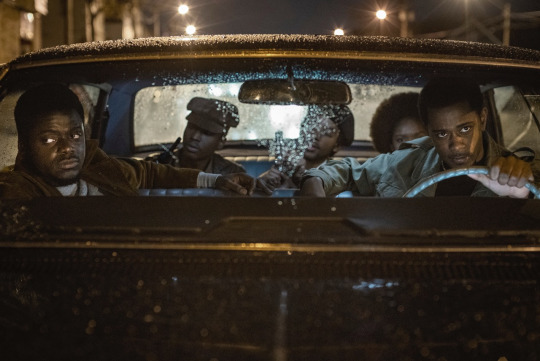
By my count, this is the second role that Daniel swiped from under your nose. Didn’t he get you for Get Out, too?
That’s right. You know what, for Get Out I auditioned for like every role. I came in and I read with Jordan Peele. And then I read for another — I think it was Rel’s role — and ended up eventually reading for my role. Damn, I forgot all about that.
How can we keep being friends with a dude who just steals roles from you, bro?
Nah, it’s all good. [Laughs] Ultimately, those decisions are made by people who have a better understanding about casting and their relation to the story than I do. If they’d asked me to play a hat in this movie, I would’ve done it.
It doesn’t seem like a Hollywood thing to do at all.
Hollywood is not always behind things like this. It took years to get it to the point where we could actually make it. These are stories people are yearning for. We have to always prove that time and time again, unfortunately, but it is what it is. We show and prove these kinds of stories are human stories. They’re specific to the Black experience, but it’s global. We hope that we can get these studios to understand that more and more.
How did you relate to [William O’Neal’s] isolation and paranoia he lived with? How did you tap into that?
I didn’t see him as someone I could connect to, so we started to design the character from the inside out. The thing is, we don’t have any information about O’Neal outside of his Eyes on the Prize interview, a couple of court transcripts, and other eyewitness accounts. We could create him from scratch and give him different dimensions. I wanted to introduce how he might be a thrill-seeker. He might get fun out of creating imbalance. He steals cars — he wasn’t very afraid to put himself in a line of fire — but he was also a person who eventually felt guilty about what he did. In the full-length version of his Eyes on the Prize interview, he says at one point, “I felt bad about the things I did, but I had to continue to play the role.” He contradicts that later by saying, “I’ll let history speak for me.” Clearly this guy has an internal struggle that we missed.
Wearing all these different masks.
In the scene where I had to poison him, a lot of it didn’t end up making it to the final cut, but we shot [me mixing it in] Kool-Aid, and I had to go through all those motions. With somebody like Daniel, who I just respect as a human and an artist, as Fred Hampton, it felt like I was actually poisoning Chairman Fred Hampton. One thing [co-star] Dominique Fishback mentioned to me is that your body doesn’t always differentiate the experience from your imagination. So sometimes your body thinks that’s real, everything you’re putting it through. It’s no wonder I’ve been feeling so stressed out and having panic attacks. I realized going forward before I step into something like that again, maybe have a therapist. [Laughs]
“There’s a dynamic between celebrity and the common man that Covid-19 has really lifted the veil on. We all gotta wear our masks or we suffer the same fate. You’re not special.”
For Black people playing an op it’s different. There’s real pressure. Especially for a character who’s never been portrayed.
That’s how I felt when I first figured out I found out who he was. But you don’t go into something like this not knowing that’s going to be the case. I hope I was able to portray him in a way that made people see themselves in the character. What decisions would you have made? Were you trying to go to jail for five to 10 years? Would you try to stay out? What does that mean? Those are the more important questions. Let’s say there’s a million people in the world: two of them are Fred Hamptons; the rest are William O’Neal. I want to challenge people to think about the ways they might be O’Neal-esque. And maybe through seeing this, you might distance yourself from some of those things.
If the pandemic has revealed anything, it’s the disconnect between the celebrity class and everyone else. People like Hampton and [Bobby] Seale are trying to do cultural work. We’re seeing that there’s disconnects here. How does a film like this impact your view of celebrity?
These roles are metaphors for so many things. Chairman Fred Hampton as a metaphor for socialism, selflessness, and O’Neal could be argued to be a metaphor for capitalism and selfishness, or perceived celebrity ego. There’s a dynamic between celebrity and the common man that exists, which Covid-19 has really lifted the veil on to a significant degree because we all sit in here on Zoom, right? [Laughs] We all gotta wear our masks or we suffer the same fate. You’re not special. This made everybody have to sit down and confront that idea.
[Laughs] Right.
One could argue that the fact that Fred Hampton died at a young age is justification as to why you shouldn’t try and put things outside yourself for the greater good, because it ends up being helpless and hopeless. I don’t agree with that. I think that Chairman Fred Hampton’s legacy lives on, like he said, “you can kill a revolutionary, but you can’t kill a revolution.” I remember being in that scene where Daniel was giving a speech, and I’m thinking, the things that Chairman Fred did all those years ago, today we are here experiencing this moment collectively because of him. While I’m doing this, I’m looking into the audience, seeing Afros, seeing Black people, seeing the beauty and the confidence and love, I don’t really even see that these days. So he zapped me back into a time where this is what people were on. We gotta find that in ourselves again and unlock it
You have a great way of playing chaos agents. Whether it’s a muted performance in Atlanta or muted in a different way in Uncut Gems, where your character was always on the fucking edge. Why do those roles as subversive figures speak to you?
I haven’t really thought about it but I know one thing’s for sure: I tend to lean toward characters who have internal dialogue or struggle. I like trying to find some groundedness and truth in the in-between of two extremes. These characters appeal to me on a subconscious level because that’s how I am. I like taking things to crazy extremes and then trying to find some kind of balance in that. I’m also attracted to characters being able to show the mirror to you and have you see something that activates something in you. Those characters that have you see yourself through absurdity.
You mentioned earlier how young these dudes were. Fred Hampton was 21 years old when he was killed. If he made 24, 25, I’m wondering how much more he could have gotten done. Being Black, we make it to 25, it’s a thing. You’re now about to make it to 30. How’s it hitting you? Do you think about age at all like that?
Not really. Not really, but to some extent, this is a landmark moment for me. I feel like I’m just starting to really get my shit together, like personally. And be the better version of myself for myself. I just started therapy just this year.
Yo, congrats.
Thanks man. Going into my thirties, I plan to continue to do it. It’s been helpful for me to unpack a lot of stuff. I’ve been through a lot of stuff, there’s a lot of things I just didn’t confront. Those things mount; you act out in different ways and they can become harmful to you. So I just said this year, I’m going to make the choice to try and be better. Like I was always throwing off therapy. I never wanted to try it. I was like, whatever. It was just something that’s bad in my family. Growing up, everyone’s like, “therapy, what the fuck are talking about?”
So I wanna continue working on that — working on myself and finding a better sense of balance, and by virtue of doing that, unlock more potential in my heart. And I’ll be able to express in a more realized, whole holistic way. Those are my ambitions moving forward.
There’s always a moment where you just know that you need it. That, there are strategies you just don’t have that you need to build to be a person. Was there a moment for you where it’s like, fuck I really gotta go to therapy. I really gotta get some help?
I wake up every day and I have the same thought: Fuck, I gotta go to therapy.
[Laughter]
I was kind of raised like a wolf. I didn’t have parents or people who were guiding me or told me anything. So I had to figure out everything on my own — try on masks and faces and hats and wigs — and try to figure out what my place is in the world. For a long time, I didn’t realize I was stunted because of that. Not having that at home, and at an early age being traumatized by things I was seeing. Just now, I’m starting to really find the tools to help me pull that young self out of that abyss. It took me a while to even realize there was a problem because I was like, “Oh, you guys are crazy. I’m not crazy.”
Were you shopping for therapists during the pandemic?
It’s all on Zoom now. I’ve found this really cool therapist. It’s great and perfect for me right now. Hopefully it continues to be the case. It’s helped me a lot. After doing press yesterday, I had another session and it was amazing. It helps you unlock things about yourself. It’s not even necessarily about the person that you’re doing therapy with, but like you said, perspectives and strategies and tools that you didn’t have access to before.
Especially in the work you do, it’s important to extricate yourself — that period of like, okay, I gotta get out of this. How have you come back to yourself in this period of time?
It’s been meditation. The one good thing about this pandemic is being able to sit at home by yourself and deal with yourself and just your inner voice. And even though that’s annoying as hell, beautiful clarity comes out of it. People would be surprised how many answers they can give themselves just by listening to themselves and not distracting yourself with so many things like social media or movies and stuff. Now, it isn’t easy, especially once you become hooked into a pattern, but it’s really worth it.
That’s been beautiful for me just to take those moments. It’s important and it’s taught me a lot about myself. And that’s kinda what pushes you. Now that you understand and recognize some of the issues that you want to make better about yourself, you can plan on ways to do that. Whether it means therapy or yoga, which I also started doing.
There’s a scene in the film that feels like the Last Supper, and it’s just gut-wrenching. That sense of dread is so hard to tap into, but it also feels of a piece with what so many of us have been going through — knowing that people are losing their lives, either from our government or from a virus, and living with that same dread.
It’s a real thing. I went to the hospital recently on some health stuff. When I was in there, there were a bunch of Covid-19 patients being moved about. Being in a hospital is pretty scary right now. People screaming and literally dying around you. There’s an overall energy. Like this feeling of loss permeating in the world today.
Before we started this movie, my best friend who I grew up with got killed by his brother. So I was carrying that with me the whole time. One thing that made those moments real for me is that I know what it feels like to lose somebody abruptly, violently. When we filmed me having to poison Fred Hampton, it was a really tough day — I was thinking about my own brother, just in a whole different place all day. On set crying. That sense of loss, knowing the violence of all of that, really informed everything for me. There was no distinction between reality and what I was experiencing in the moment. Most of the takes in that scene, I was actually bawling. I had to tone it back.
The worlds are just overlapping with one another. That’s fucking wild.
I hope having gone through all that, somebody watching it can be moved or touched. Maybe it helps put emphasis on Fred Hampton and why it’s so valuable to protect people like him.
As someone who lost someone close recently, some days it feels like your worlds are collapsing on one another. I just lost my dad this past summer. It’s weird to even talk about, but the fact that you have to just carry on, with your friend’s death sitting in the back of your head is…wild.
With movies, you never know if we’re doing the right take, or even if it’s ever going to be seen by anyone. Especially with something like this, you never really know. I’m so grateful for everybody putting their best foot forward. I want everybody to see it. I really want Black people to see it, especially Black kids in Chicago. I want them to see someone who really put things outside of themselves and put something first and gave in love. I just hope that somebody sees it and it touches them. It makes them think about something a little differently. That’d be dope.
This interview has been edited and condensed for clarity.
#black history#black men#black panther party#black panthers#black people#bobby seale#chicago#daniel kaluuya#fbi#film#fred hampton#interview#lakeith stanfield#shaka king#usa
5 notes
·
View notes
Text
Best of DC: Week of December 18th, 2019
Best of this Week: Doomsday Clock #12 - Geoff Johns, Gary Frank, Brad Anderson and Rob Leigh
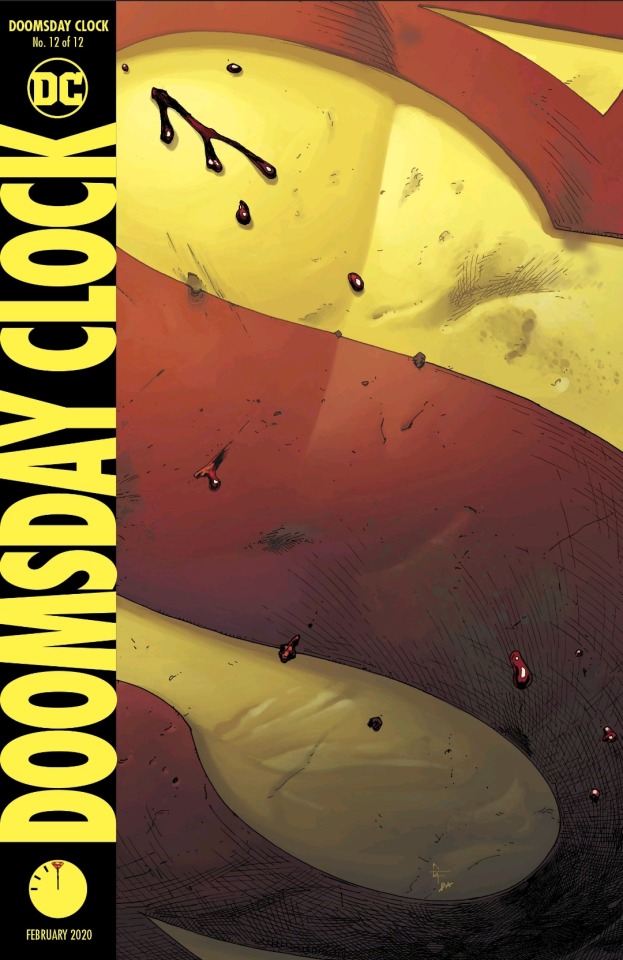
It’s finally over.
Doomsday Clock started in November of 2017. I remember the Wednesday when it came out. I chose two copies, the main cover for a friend and the Superman Variant cover by Gary Frank for myself. I even received a button that I still wear, faithfully on my signature hat. I was excited for this crossover - this confrontation between Alan Moore’s greatest creations (in my opinion) and the bright and colorful heroes of the DC Universe. At first, everything started off so well. The book came out monthly and it was amazing...for all of two or three issues.
Soon after, the book switched to a bi-monthly schedule so that Johns, Frank, Anderson and Leigh could tell the story right. I was willing to wait and every single issue was worth it...up until more delays. If the math were correct, the story should have finished in December of 2018, but here we are in December 2019...at the end of this long ass journey and I can honestly say that it was all worth it.
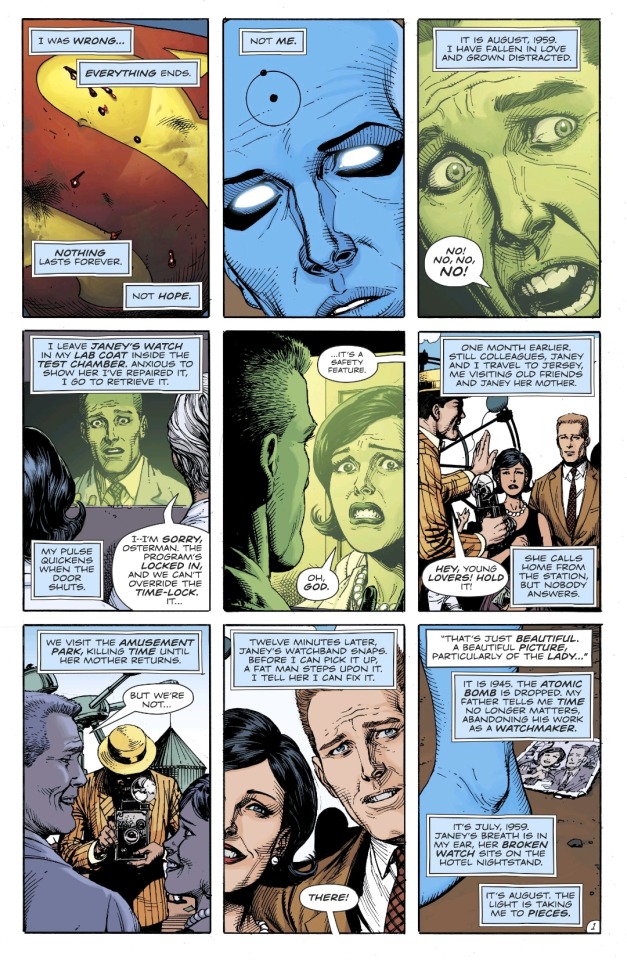
By God, was it worth it.
It’s hard to discuss what goes on in this book because I feel like it’s less about what happens in it and more about the meaning behind specific actions, reveals and reappearances. One of the things that we were sold on during this series was the inevitable confrontation between Superman and Doctor Manhattan and Geoff Johns manages to subvert our expectations n a good way in that the fight never quite happens, but is more of an ideological debate between cynicism and hope, something that’s been at the heart of this story and DC Rebirth since the beginning.
*MAJOR SPOILERS AHEAD*
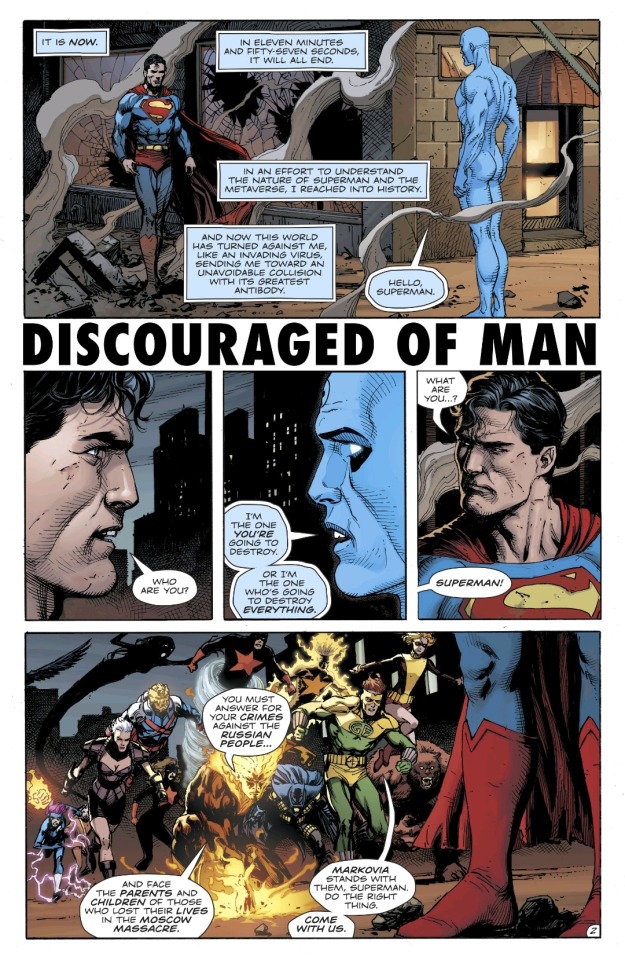
Finally confronting each other, Superman asks Doctor Manhattan who he is Manhattan explains that he is either the one who will destroy Superman or be destroyed by Superman. Before they can delve deeper into that conversation, Superman is beset on both sides by the forces of Russia with Markovia and those of Khandaq. Pozhar and Geo-Force order Superman to answer for Firestorm’s supposed crimes against Russia and Black Adam tells them that he will be held accountable in Khandaq. Tensions rise and the battle is on as Manhattan looks on at the powder keg that he has created.
Because of his curiosity and meddling with time, he has created this timeline where hope is fleeting and the Metaverse, as he calls it, is fighting back with Superman caught in the middle. Because of him, the Superman Theory has caused a palpable amount of distrust between the various nations and his causing Firestorm to explode only made those tensions worse. In an effort to understand his final visions of the future, he staged everything in an effort to get in front of Superman.
He has a monologue in his mind where he states that he is caught in a question of two answers, the answers he gave Superman earlier. Superman fights back against both sides as they fight each other. Meanwhile in Gotham City, Reggie Long, the new (former) Rorschach, is saved from an attack by a red hat wearing man by Alfred. Alfred tries to get him to don the mask of the man who killed his father again and Reggie violently pushes Alfred against a wall and decries his former hero and says that he sees no future, no hope, much like Doctor Manhattan.

Gary Frank makes excellent use of the nine-panel grid to show the emotion on Reggie’s face and how much all of this is affecting him. Interspersed between these panels are shots of Superman fighting before we get an AMAZING double page spread showing the block wide battle between the forces of Russia-Markovia and Khandaq. Vostok-X is thrown into a building, Black Adam fires lightning at Tara Markov, Giganta fights another giant hero, even the Batman and Superman of China make appearances as a past panel noted that heroes from around the world have gone to help Superman or oppose him in Washington.
In the middle of Reggie’s breakdown, Batman shows up and offers him encouragement, apologizing for not believing him earlier in the story. He tells Reggie that even if he hates what the mask stood for, he can give it his own meaning, become his own Rosrschach. This is when the theme of hope begins to build up more as in the middle of the big brawl, Superman does everything he can to save people. As a car is about to crush a family, Superman steps in to save them, he then pleads with Doctor Manhattan to do the same.
Up until this point, Doctor Manhattan had been operating on the idea that there were only two possible options to end his fight with Superman, he even reveals that he’s the one who erased Superman’s friends, mentors and killed his parents. Frank and Anderson then draw four amazing panels. Superman cocking his fist back, eyes full of rage, Doctor Manhattan closing in as to accept his fate, Superman lunging forward with the fist outstretched to the reader and concluding with one punch to an attacking Pozhar, saving Manhattan.

Manhattan is almost left dumbfounded and asks why he’s done this. Why did he save him? Superman replies that there’s a third choice to be made. Superman takes note of the pictures of Janey that Manhattan leaves around when he appears and questions that maybe the darkness that he sees is a result of him using his powers to save the universe like he wishes he could have saved himself and his world.
Doctor Manhattan raises his hands and says that he understands, releasing a surge of energy that makes everything fade away. One of the most powerful shots of this entire book are of Superman’s logo slowly dissipating and then thirteen panels of darkness before we see the Rebirth of everything and Clark’s place in the Metaverse. The fight goes on, but as Superman begins to fall, he receives help in the form of...Everyone. The New Legion of Superheroes and the Justice Society of America bring up the rear in quite possibly one of the most beautiful double page spreads in the book.
It’s easy to understand what Hope is to Geoff Johns. He’s a classic man. He sees hope in the DC Universe as the old heroes. The ones who aspired to do good and be good for reasons above themselves. The JSA inspired Superman to become a force for good and in turn, Superman inspired the future Legion. There’s a reason he wanted this series to reintroduce them in the wake of the darker, grittier New 52 and reinforce that darkness isn’t the only way to find the light. At the same time, Johns uses this book as an opportunity to explain the structure of the Metaverse, Superman’s place in it and inform future stories, crises and timelines for the DC Universe.

*SPOILERS MOSTLY OVER*
When Superman lifted that car in 1938 it was just the beginning, but when Barry Allen created the Speed Force, the universe had its first divide and Superman’s timeline shifted up. This split created Earth-2 where Golden Age Superman still resides. The first Crisis divided the Earth again, creating Earth-1985 and at the center of that is still Superman. After Flashpoint and subsequently Rebirth, Earth-52 was spawned.
Superman is the glue that holds everything together.

Superman is the quintessential hero that everything revolves around and he will always show humanity the way. He’ll appear on many Earths at many different points in many different timelines to inspire hope where none can be found. That’s why I love this story so much. Even though Superman and Manhattan didn’t appear in it very much in the first half, their presence was still felt throughout. There was always this air of hope versus despair and we see who won out. The Watchmen Universe served as the perfect deconstruction of superheroes, but what we’re witnessing with Doomsday Clock is the reconstruction.
It’s the returning of the ideal that’s been lost to so many following endless gritty reboots, terrible political conflict in the modern day and lack of truth, justice and the American - no, Human way. In an age where people don’t know how to write a Superman movie, Doomsday Clock should be the example. Against all odds, Superman managed to inspire a being that has shunted away their humanity for the black and whites of logic instead of focusing on all possible options based on hope.
Doomsday Clock may not exactly stand on the same pedestal as the story that inspired it, but it absolutely should stand high. Gary Frank is an amazing artist that gave this book the weight, scope and respect that it deserved throughout. Amazing faces, body language, scene framing, use of visual motifs such as the Carnival picture puts this story above and beyond in terms of art quality. The way he managed to cram so many heroes on only two pages with insane amounts of detail for each is a testament to his ability and similarity to Watchmen artist Dave Gibbons.
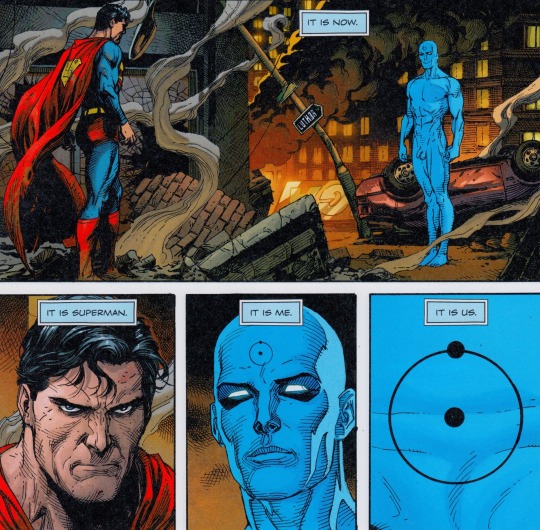
Brad Anderson’s colors gave each individual issue their own unique feel with this one making good use of Doctor Manhattan’s blue light in the form of being a new symbol of hope in the face of the dark inks and oranges of the destruction taking place. Even when the mass of characters appear, no one gets lost in the pages because their colors are so distinct and recognizable amongst each other.
This story also couldn’t have been told without Rob Leigh’s amazing lettering. The way that we can distinguish between Manhattan’s dialogue, feel the weight of every character’s words and the bubble placement shows a level of skill that allows us to enjoy the flow of dialogue without losing any of the art.
It’s been a long journey to finally get here, but it has been worth the wait. Even if the current state of the DC Universe has either gone past this story or if it’ll need to be retconned to have been before the current events of Year of the Villain, there’s still a place for it in the overall landscape. I loved all of this and this is the kind of story that makes me glad to be a comic book fan. There’s nuance to everything, a good few messages and amazing art. Better yet, it ensures Geoff Johns future legacy will be one of hope and inspiration thanks to the time that he loved so much and hopes to get back to.
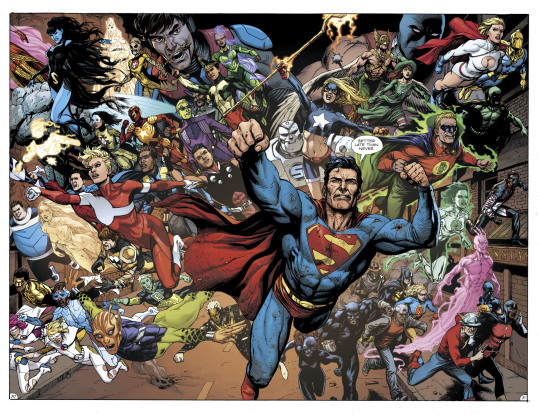
I welcome the return of the Legion of Superheroes even as I’m not the biggest fan of Brian Michael Bendis. Even more so for the Justice Society of America whenever they get a new series announced. It’s great to see the classics again and I’m interested as to how they’ll do in this new modern age.
As for Doctor Manhattan and the rest of the Watchmen characters, without a doubt I think we’ll be seeing some of them again at different points. They didn’t overstay their welcome or absolutely destroy everything like I thought they might, but we know that they’re around and we know there’s still stories to be told despite Alan Moore’s own feelings on such things.
This isn't the perfect sequel to Watchmen, how could it be? But it is an amazing Watchmen adjacent book that builds off of the themes of that story and injects the DCUs vision of hope and justice into these characters. For that, I am glad to have read it.
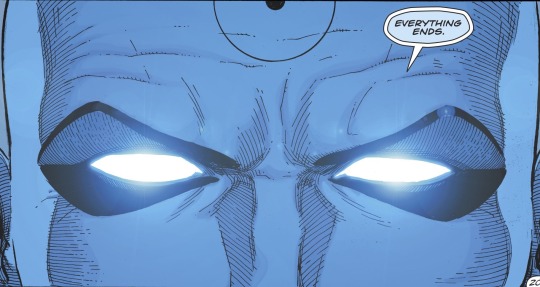
Doomsday has been avoided and we have several hours before midnight, at least for now.
#doomsday clock#doctor manhattan#superman#justice society of america#legion of super heroes#geoff johns#gary frank#brad anderson#rob leigh#dc comics#comics#comic review
35 notes
·
View notes
Note
ACCEPTING ANXIETY, Part 1/2: Excepting Anxiety!
[Thomas]: Uh, hey…uh- this is Thomas, and, uh--this is usually where I start off, uh- by saying something quick and witty to begin the video. Yeah.
*logo*
[Thomas]: So yeah! Another video. This is awesome! Oh wait, actually, I usually start off this video by saying “What is up, everybody!” But you know, I don’t actually hear your responses. And, strangely enough, I’m not concerned about consistency today. You know what I wanna talk about? Eatin’ food. Or you know what, actually? Maybe about that TV show I just watched. Or maybe I should just watch another TV show and eat some food. That’s it. Alright, until next time. Take it easy, guys, gals, and non-binary pals--
[Logan]: Uh, if I may… I’m going to step in for a second.
[Thomas]: Ahh, Logan’s here, so I probably did something wrong.
[Logan]: What? No. You just seem to be a little… uncharacteristically… careless.
[Thomas]: Hm. I hadn’t cared to notice. Ah- pfft, that’s it, there it is, that’s what you were saying.
[Logan]: Yes… I mean you tend to start the video with at least some sort of direction before the inevitable internal conflict.
[Thomas]: They do usually follow that story arc. But, maybe, that’s a good thing. You know, like, changing it up.
[Logan]: No. I mean… maybe. I don’t know, you’re confusing me. I think I have a vocab word for this. Uh. You good, fahm?
[Thomas]: Wow. That was bad, but like, you’re a really good try-er, Logan. You’re really good.
[Logan]: Thanks.
[Thomas]: ...If anybody, like, texted me… ooh!
[Logan]: Thomas, you didn’t answer the question.
[Thomas]: Your question about whether or not I’m good, fam?
[Logan]: That’s the one.
[Thomas]: You’d probably know if something is up because you usually provide, you know, the explanatory exposition in my videos because all the other characters are too zany or relatable.
[Logan]: Okay, I’m at a loss here. Should we check on the others?
[Thomas]: If you want.
[Logan]: I do. I do want… that. Are you going to-
[Thomas]: Morality! Creativity!
[Roman]: Wow. Rude.
[Patton]: You too cool to call us by our names, kiddo?
[Thomas]: Nah. That was just the easiest way to, you know, quickly establish what you guys generally represent, in case there are any new viewers watching.
[Logan]: Jeez. Okay, I- consider taking a more nuanced approach with that explanation next time.
[Thomas]: He’s my logical side. He’s my logical side.
[Roman]: Uh… is everything Gucci, Thomas?
[Logan]: I suppose I could’ve posed the question that way as well, but that is precisely why I wanted you two here.
[Patton]: You mean us three?
[Logan]: Oh, did I say three?
[Patton]: No.
[Logan]: Then I guess I didn’t mean three.
[Patton]: He’s made mistakes before.
[Logan]: An uncommon occurrence.
[Patton]: Well then you might say the amount of mistakes you’ve made is... infinitesimal?
[Logan]: You make ONE MISTAKE, and THIS is what happens!
[Roman]: Okay, time out for thee and time out for thee, focus on issues or focus on me.
[Logan]: -groans- Okay, you’re right. Let’s get down to business.
[Thomas]: To defeat…
[Thomas and Roman]: The Huns!
[Logan]: Please stop. Stop, please.
[Thomas]: Come on!
[Roman]: I’m sorry. I’m sorry.
[Thomas]: Mulan!
[Logan]: Thomas, that aloofness that you are displaying is highly… unproductive.
[Thomas]: You mean I can’t make babies? What? Just kidding. Uh...
[Logan]: Can someone else please- some whe- le- Flames. On the side of my face. See- Seething… Seething fire.
[Patton]: Is something bothering you buddy?
[Roman]: An unattainable dream? A hopeless romance?
[Logan]: Lack of sleep, a- a puzzling situation.
[Patton]: Having trouble with adultery?
[Thomas]: Oh yeah, you always say that instead of ‘becoming an adult’ or ‘adulthood’. As if you didn’t know the troubling definition of the word you’re using, which actually means, you know, when a-
[Roman]: Wait! Pumbaa, not in front of the kids.
[Patton]: Well, I don’t know what you two are talking about, but something definitely seems to be off.
[Thomas]: You keep saying that, but honestly, I’m good… fam.
[Patton]: Now, don’t you go shortening the word family by cutting out my three favorite letters: I L Y.
[Logan]: Okay, well, Patton definitely seems to be doing okay. How ‘bout you, Roman?
[Roman]: Let’s see, uh… Disney references, regal appearance, general awareness that I’m better than you two… Uhh, I’m feeling pretty good.
[Logan]: Then what could be wrong here?
[Patton]: Boy, you both always act like you know all the answers… So, it’s surprising that you keep overlooking something so simple.
[Roman]: Oh, is that so, Patton? You're so cute.
[Logan]: And, uh- what might that be?
[Patton]: Where is Anxiety?
[Logan]: Hmm, do you honestly think it’s necessary to have him here?
[Roman]: To offer his mopey, dopey input? I- I don’t like him.
[Thomas]: I’m still hungry.
[Logan]: No- No.
[Roman]: S-Stop him. Stop him!
[Thomas]: *Singing to himself while looking in the kitchen*
[Logan]: Thomas, this is highly… -sighs- We can’t afford these detours… anymore.
[Thomas]: Ooh! I found some granola!
[Roman]: We’re try- we’re doing a- we’re doing a vid here, buddy.
[Logan]: Alright. Well, at least it’s something healthy.
[Roman]: Thomas, isn’t there a more important thing that you should be focusing on right now? Oh, you’re just getting it all over the carpet, aren’t ya? Alright, well…
[Logan]: Wh- What if you have guests over?
[Thomas]: That wouldn’t happen for a while so it’s not really a big deal.
[Patton]: Well, he’s definitely inviting some ants over. -chuckles-
[Logan]: Just aunts? No uncles?
[Roman]: Can you at least- Can you take off the hoodie? Like, you look like a hot mess. Nay, not hot, cool. Nay, not cool, uncool. An uncool mess.
[Thomas]: If you want me to. *takes of hood revealing very messy untamed hair*
[Roman]: Oh, dear, sweet MOTHER of hairbrushes, what IS your hair?!
[Thomas]: I’m just letting it do it’s thing.
[Roman]: There’s a… lot of viewers that are going to see you like this so-
[Thomas]: Eh, they’ve seen me on better days, so it evens out.
[Logan]: You know, Thomas, I don’t know if that makes sense.
[Patton]: You have kind hair.
[Thomas]: Oh, thanks I guess.
[Patton]: Kinda hair that grows on a dog’s butt! *laughs*
[Thomas]: That’s probably an accurate comparison.
[Roman]: Ugh, just put your hood back on.
[Thomas]: *snaps his fingers* You’re the boss, Hoss.
[Roman]: What does that even mean? I’m not… Hoss. I’m Prince Roman. Ugh, okay. Well, better bring in Count Woe-laf. Any input is better than what Mr. T is contributing.
[Thomas]: Roman brought the clever nicknames to the table, I brought the oats and honey clusters to the table.
[Roman]: Put them down!
[Thomas]: Okay.
[Logan]: Fine. Let’s get him in here. Anxiety? Hm. That’s odd.
[Roman]: He’s probably listening to that PG-13 music again. Anxiety! *tries to summon Anxiety* Ugh. How dare he? What?
[Patton]: Now, now, try to be a little more loving. You catch more flies with honey than vinegar. Anxiety! Come on up here, kiddo. Come on up here so everyone can see that cool makeup! Welp, love has failed me.
[Thomas]: Ho-ho-ho! That can be applied to many instances in my life. The first being-
[Roman]: Steady now, Thomas. Are we really going down that road? Uh, you usually don’t like talking about that kind of stuff.
[Logan]: You’ve got no shame.
[Patton]: Definitely not much of a filter.
[Roman]: Yes, and no fear…
[Logan, Patton, and Roman]: You have no-
[Thomas]: I have no anxiety, is that what you guys are trying to say?
[Roman]: Okay… Well, he also has no sense of tension build-up. That’s disappointing.
[Logan]: This is very disconcerting.
[Roman]: I don’t know. Shouldn’t a lack of fear be a good thing?
[Patton]: -gasp- Roman, I’m surprised at you.
[Roman]: What?
[Patton]: Anxiety can be a gloomy goober sometimes, but he’s still one of us.
[Roman]: Is he though? Check it out. Morality, Logic, Creativity. We three, are the most important facets of Thomas’ personality. Plus we all contribute a little extra stuff too. We got along just fine without him in the first two Sanders Sides videos.
[Logan]: He may not have had a physical presence, but he was always there within Thomas, to some extent. And he contributes more than what you credit him. Plus, he too, may represent more than just anxiety, even though it is a significant part of who he is.
[Roman]: Even still, I just don’t see why he’s necessary. If Anxiety is gone, what do we have to lose?
[Thomas]: I don’t fear death.
[Patton]: Wow.
[Roman]: So, you’re super brave. That’s good.
[Logan]: There’s a difference between bravery and acting without caution. Think fast! *Chucks a laptop which hits Thomas in the back of the head*
[Roman]: Oh, my- sweet Cole Sprouse, what-
[Thomas]: That really hurt. Was that a laptop? That, like, hurt real bad. Woah…
[Logan]: Unalert, and without his natural defensive reflexes. Yes, it seems that Anxiety has officially clocked out.
[Roman]: Okay. Well, he can work on that.
[Logan]: Thomas, did you remember to lock your motor vehicle earlier today?
[Thomas]: I probably did, I’m not sure, but probably.
[Logan]: Weaker memory.
[Roman]: Wh- that’s not a symptom of a lack of anxiety.
[Logan]: Not directly, but with the anxiety over leaving his car unlocked… Thomas always double checks to make sure, securing that memory in place.
[Thomas and Patton]: I doubt anyone will go looking through my [his] car- oh my gosh [goodness]!
[Patton]: You just see the best in people.
[Logan]: But he can’t always afford to.
[Patton]: Ugh, yeah… I guess you’re right.
[Thomas]: Well, it sounds like I’m in trouble or something.
[Roman]: No, it sounds like these two are worrying too much.
[Logan]: That’s the thing- is anyone among us worried?
[Patton]: It’s because he isn’t worried and that doesn’t seem right, Roman.
[Thomas]: Princey’s never liked Anxiety, that’s his problem!
[Roman]: That’s not true.
[Thomas]: Mmm…
-flash back-
[Anxiety]: Hey there, Princey.
[Roman]: Ohhkay, I can’t stand that guy.
-switch flashback-
[Roman]: (as Valerie) I’m trying REALLY hard not to like you right now.
-switch flashback-
[Roman]: Still don’t like you.
[Anxiety]: What was that?
[Roman]: Uh- chim chim cheroo!
-switch flashback-
[Roman]: To offer his mopey, dopey input? I- I don’t like him.
-end flashback-
[Roman]: Oh, now your memory works… That’s convenient.
[Logan]: It is interesting to note that Patton and I have both had our moments of seeing eye to eye with Anxiety… But you seem to remain resolute as ever in how you perceive him.
[Roman]: Look, I am the dreamer, and the one BIG thing that gets in the way of pursuing any new adventure, is fear.
[Thomas]: *holds up a pair of jeans* Took my pants off!
[Roman]: Why?!
[Patton]: Hey, now.
[Thomas]: No one can see, I don’t care.
[Logan]: Yup, we are getting your anxiety and shame back. I cannot deal with any more of this ridiculousness.
[Patton]: You put them back. Right now.
[Thomas]: Alright, fine. Well, if Anxiety’s not here, where is he?
[Roman]: Ugh, probably in his room.
[Thomas]: His room?
[Logan]: Technically, it’s the corner of your mind that you go to if you wanted to enhance your anxiety, for some reason… Or if you wanted to cathartically indulge in typically troubling emotions. Think, “the mind palace,” but specifically for Anxiety.
[Roman]: Where else do you think we come from? Where do we go?
[Patton]: Where did you come from Cotton-Eye Joe?
[Thomas]: So, you all have one? Oh, my goodness- more stuff I’m learning about myself. Uh, I’d rather go to Patton’s. Can we go there?
[Logan]: Nope. We need to go to Anxiety’s room to check on Anxiety. This is the priority, do you remember what we just... were talking about?
[Thomas]: Ah, okay.
[Roman]: So we’re all going to Anxiety’s room? Who knows what THAT tragic kingdom looks like? Hhmm…
[Patton]: Are you going to join us on this Thomas? ‘Cause we need you to get us all there.
[Thomas]: Yeah, it sounds fun or whatever.
[Logan]: Ohhkay. I thought I would like you without your… never-ending assembly line of predicaments, but this is truly, truly bothersome.
[Roman]: Just focus on the things that would normally make you anxious. That is the corner of your mind where we need to go. It may be difficult to go down that road-
[Thomas]: Got it.
[Roman]: ...Yeah, okay. There is no drama in this today.
[Logan]: Ugh. Into the unknown. Here we go.
[Patton]: ♪ Again on my own, going down Anxiety’s corner in Thomas’ mind… ♪
[Thomas]: Oh, I guess I’m doing this too. This is new.
-in Anxiety’s room-
[Thomas]: Woah. -chuckles- I knew I should’ve taken that left turn at Albuquerque. *snaps his fingers*
[Logan]: Uh, no. This is where we needed to go.
[Thomas]: I know, I- it was- it was just a- uhm�� a joke.
*To be continued Guys, gals, and non-binary pals…*
*end card*
[Roman]: Wh- are- are you serious? A cliffhanger for a YouTube video??
[Logan]: Highly unusual… and frustrating.
[Patton]: Oh, I’m sure it won’t be that bad. How long do we have to wait?
[Logan]: According to Thomas’s schedule, just a couple of days.
[Patton]: Yay! And knowing Thomas, he’ll get this video out when he says he will, right on time.
[Logan and Roman]: Riiiight…
Oh my stars. I read this whole thing btw. I didn't actually expect you to do it. Dang.
#asks#Lee!!#reading this made me really happy for some reason#probably the memories#i love the AA ark sm
2 notes
·
View notes
Note
Deku!
I know it’s been a while, but this ask was in response to a post I put out asking others to give me characters from HeroAca other than Hawks to stretch my character analysis skills to see what theories, predictions, or just interesting observations I find. Because this is outside the realm of my usual character subjects and my style may not be well known in this tag - I ramble and am long-winded, hence the cut to not be obnoxious to scroll past. As a manga reader I won’t add any information past the anime’s run so far if you’re curious and want to hear what I have to say.
Deku’s an interesting character to look at in the series because compared to the way we find out about literally every other character, we outright know what he’s thinking or what he’s doing or how he’s feeling, so any development we see from him we pretty much see it coming from a mile away. He’s an open book.
In contrast, not many fans were able to see how Aoyama may have been struggling with feelings of inadequacy over his abilities - particularly in the Sports Festival Arc; and this became obvious with the license exam in season 3, but the point goes that while many fans saw it coming, there were those who weren’t able to read between the lines and saw him as a two-dimensional joke character meant to fill up the class roster up to that point.
We don’t really have that level of mystery or uncertainty with Deku. As the main viewpoint into the series and the world Horikoshi is building, we’re basically experiencing everything that’s happening vicariously through Deku. Yet, it’s not like there’s no room for theories, specularization, or characterization with his character. I’ve already said I’m avoiding spoilers so theories and most speculation are out of the question as I can only vaguely hint that there’s some potentially neat thematic parallels beginning to be explored in part through him, but that’s about as many of the beans I can spill without dumping out the whole thing.
I had some neat stuff to talk about before I actually sat down and started writing this and realized so much of it was spoiler-y; but at least in way of my opinions on Deku, I haven’t actively rooted for the main anime protagonist like this in a while and his likeability is off the charts. That said, he’s not a stellar role model just yet, mainly due to his hero complex. We’ll see some of the nuance of this subject explored in the next season, but by and large Deku’s drive to save people can use some level-headed reigning in before he acts. There are many times where his action is completely appropriate and justified - almost always when there’s someone right in front of him that needs saving; and let me make it perfectly clear that the unyielding drive to help someone in distress is a positive quality through and through; but when he goes out of his way to break the rules and disregards the repercussions in order to save someone I’m kind of surprised he hasn’t gotten in much bigger trouble so far what with his history of it at this point. That’s all to say that he’s a loose canon in the series so far and needs more experience before he’s real top hero material.
However, I don’t think this lone wolf mentality is what Horikoshi is trying to glorify or endorse through the series. My guess is that the series as a whole is philosophically leaning towards the Good Samaritan principle. (I said I wasn’t theorizing, but I guess I’m a liar now.)
If you aren’t familiar with the story of the Good Samaritan, it’s a parable in the Bible Jesus told about doing the right thing in helping others, no matter who you or the other person is - even if under normal circumstances the person you’re helping would despise you. This story is so iconic that there’s a type of law named after it - The Good Samaritan Law. (And if you’re unfamiliar with it you should read it and the other parables in the Bible, they’re not just moral tales but might get you good points on an English/Literature essay if you reference them well.)
It differs from place to place and not all countries have them, but the principle is if you think someone is in immediate danger and you attempt to save them they can’t turn around and sue you for “wrongdoing.” For example, if you see a baby or an animal locked in a car on a hot day and you smash the windows to pull them out and get them cooled down, whoever owns that car can’t sue you for smashing their windows and damaging their car. There’s a lot more nuance and fine print, but that’s the basic idea. In many cases where this law exists it actually legally obligates the bystander to help. The hope is that these laws help reduce the Bystander Effect (really neat if you look it up, but also scary and very humbling) and encourage people to help those in imminent danger without fear of negative repercussions.
Something I didn’t quite realize until now is that with the advent of a superhuman society, the Good Samaritan Principle is largely done away with all the way across the globe. Even if people are in active, life-threatening danger, you can’t use your powers to step in unless you have a hero license or you risk getting in serious legal trouble. To an extent this is understandable in a precarious and delicate situation - just look at the precision called for in the second half of the Provisional License Exam; but it occurred to me that not only are everyday people discouraged from getting directly involved they’re actively penalized if they do! If a hero was already on the case or shows up while you stall for time it makes sense to not insert yourself and complicate matters - you wouldn’t get in the middle of a hostage negotiation, for instance. Yet, that’s not what we see reflected in the series. There’s an over-saturation of heroes to the general public so that there’s almost always a hero close by to swoop in which rarely ever leaves an opening for someone else to step in while a hero is on their way; and the problem with this is that it leads to an over-dependence on heroes to intervene in other’s lives instead of taking the responsibility into one’s own hands as a citizen of the community.
This has repercussions that are directly echoed across the series, even (and especially) up to date. If you’re not a hero, you’re supposed to step back and let a “professional” handle it. If there’s truly no “Good Samaritan” exception in the world of HeroAca then that really gives Deku a solid ideal to embody and work towards in his world. He outright inspired All Might at the beginning of the series because he demonstrated the Good Samaritan Principle when rescuing Bakugo.
“It doesn’t matter that he hates me and bullies me and steps on my dreams. It doesn’t matter that I’m not a hero and can’t even stand up for myself. It doesn’t even matter that I don’t have any kind of superpower to use in this situation. He’s in danger and if I don’t do something now he’ll die! I can’t let that happen, and I won’t let that happen!”
That’s literally the parable in a nutshell. He even gets reprimanded for it after the fact, but he certainly doesn’t apologize for it. Deku is the personification of the “hero’s heart.” It’s recklessly helping others when they need help, and the moment he recognizes that someone is lashing out in pain (a la Todoroki or Shinsou or even Bakugo) he instantly recognizes that even though they may be against him in the moment and that threat needs to be reigned in, they’re still as much in need of saving as someone falling from a building. While All Might deterred crime through threat of force, Deku is on track to deter them before they even get to that place at all, and his character is making a case of normalizing this mentality instead of drawing black and white lines in the sand and chasing the symptoms of the disease rather than the cause. (I’m literally having a big brain moment typing this, “All Might-y power” in one generation vs “Deku” as someone who might normally be worthless but only needs a nudge to become “Dekiru/ I-can-do-it!”)
It’s a theme resonating through the series about how heroism and villainy both have roots in the heart, and while there are threats that have to be dealt with in the immediate and physical, there’s still an emotional and psychological component that has not only gone unaddressed for too long but is directly responsible for the surge of villains in society. You can already see it in so many of the League of Villains’ members (and some of the more troubled heroes) - if someone had been there to reach out their hand and metaphorically save them when they personally needed it in their lives (“It’s okay, I’m here.”) then they probably never would have become bad guys in the first place.
When all’s said and done, I think that’s the point of Deku’s character in the story, why he’s the main character, and why he’s going to be the greatest hero in the world.
~~~~~
Wow, that was more satisfying to write than I thought it would be. And to you, Momo and Uraraka anon, I have heard your question and I am trying to get it out soon. I just have… Much work to do.
After that, though, I hope to open HC requests again soon!
#deku bnha#deku mha#she writes#bnha meta#mha meta#bnha deku#mha deku#midoriya izuku#izuku midoriya#spoiler free
21 notes
·
View notes
Text
who’s the true protagonist of trc?
okay, this is inspired by an old deleted post by, and a later conversation with @lynchlesbian about the “adam parrish and his band of merry men” line by the gray man, and us wondering what the fandom consensus is on who the real protagonist of the series is and why. i think mstief did a decent job of putting alll of them on the same level narratively speaking, or at least giving them the same amount of space, so a case could probably be made for all four characters and no option would be wrong a priori.
i’ll put the rest under the cut, because this is going to be a little long.
i still wanted to try and break this down with a more thorough analysis. so, i think we should start by the definition of what a protagonist is: the term comes from ancient greek drama and literally means “first actor”, in the sense that the protagonist was literally the character that made the first appearance on the stage and was the focal point of the story. i consulted a number of websites and they all seem to agree on the fact that for most of history and in most cases a protagonist is also the hero, simply defined as the character we hope to see “win”, and the main character of the story. but sometimes the three do not coincide, and there begin the problems, because if they’re not one and the same we need to define separately what a protagonist and a main character are. and academia apparently hasn’t got a single and unanimous outlook on the matter, which makes things a little confusing.
the main character is easier to classify:
it is either the character from whose perspective the story is written (sometimes this is also called the “point-of-view” character – in this instance gansey, blue, adam and ronan are all unequivocally main characters)
or simply the character with the most screen time (again, all four are main characters)
but, as defined in this article, usually a main character is also a character who experiences inner conflicts, and how said character resolves those conflicts often determines how the external conflict is resolved; to avoid confusion, i will call this case that of a “central character”
the protagonist is where things get muddier:
it is the person who opposes the antagonist (this is easy, they’re all protagonists again, save for tdt maybe, where ronan is the protagonist and the other are all co-protagonists)
it is, mainly, the character who is the primary pursuer of the story goal, which affects or involves most of the characters and its the source of external conflict; often the protagonist tries to persuade the other character to follow them in pursuing the goal
it can be the person who drives the plot, the one who makes decisions, who makes things happen and creates action; one writer suggested here that greg, the father of the family, is the protagonist of little miss sunshine because he drives the story forward by driving the car. i don’t necessarily agree with this interpretation, it feels somewhat simplistic, but there you go
it’s also a character that undergoes change, emotional, intellectual and/or spiritual growth, and travels from a point a to a point b, either literally or figuratively; at the end of the story they’re often wiser, more nuanced, better or just changed people
now that we have our definitions, we can start applying them to the characters.
let’s start by the most obvious one, i.e. gansey. if you want my straightforward opinion, gansey is the protagonist of the story; it’s not the answer my heart wants to give, but it’s the one that makes most sense to me. all characters are involved in the main plot, but gansey is the one clear pursuer of the story goal and the focal point of the story. whilst reading, the questions we’re supposed to ask ourselves are, will he find his dead welsh king? will he survive? why was he brought back to life the first time anyway? and, of course, he is the unspoken leader of the gangsey. and when someone challenges that leadership, he acts hurt and offended, like for the most part of tdt where he shuts adam out and feels betrayed by him. actually, in his words, the betrayal feels worse than if it had come from ronan, because evidently gansey wasn’t expecting adam of all people to discuss his central role in their quest. but. BUT. as per our precedent definitions, the protagonist is supposed to change and grow as the story progresses and this doesn’t seem to be gansey’s case. in fact, one could almost say that his main character flaw is his inability to change. he starts at one point in the story and he finishes in the exact same spot. the narrative denies him the possibility to become a better person and rectify his mistakes. and he’s also not always, perhaps not for the most part, the person driving the plot forward, making decisions and creating action.
in fact, that role could be fulfilled by adam or ronan. adam is the first character to create action, because a) he’s the one asking blue out and therefore making their fates intertwine, and b) he’s the one who convinces gansey to go to the psychics about glendower. he also jumpstarts the narrative by waking the ley line, thus setting the magic element in motion. he makes a bargain with cabeswater and becomes the link between the boys and the forest; he painfully learns how to communicate with this sentient entity and he reshapes his future by choosing another tarot card at the table; he becomes the magician, he comes up with the plan to blackmail greenmantle, he finds out how to wake the animals in the valley of skeletons, which later allows blue fo find her mother; he learns to scry to help ronan with his dreams; he’s the one suggesting to ask cabeswater to sacrifice itself for gansey and he’s pivotal in the process or reviving him teaching cabeswater about humanity. person driving the plot? check. he also undergoes a lot of personal change. he frees himself from his abusive household environment, he cuts ties with his family and goes on to live alone and support himself financially; he grows so much as a person, learning to count more on his friends, to let go of his pride, to control his anger, even when he has every right to be angry, and to not vent it out on others, to let himself feel things. so, character who undergoes personal growth? check. but he admittedly isn’t the focus of the overall story, the role is still gansey’s.
a similar argument could be made for ronan. he is the dreamer, he manifests cabeswater, he’s a main driving force of the entire story. as with adam, he changes a lot from the beginning to the end of the books: he starts out by being this ever-angry boy, all sharpness and edges because he’s grieving and traumatised but slowly begins to heal, to find some kind of closure with his father; to free himself from his self-hatred, to accept himself the way he his; he learns to control his dreams and to free himself from kavinsky’s toxic influence; he becomes a better friend to blue and lets himself love his crush, he loses his mother in a horrifying way but he’s there again for his friend shortly after; he becomes a parental figure for opal. so we find ourselves again in front of a character who carries the story forward and has a notable self-growth throughout it. at this point, one could be tempted to say he’s the true protagonist because there’s a novel in the series entirely devoted to him, but it’s exactly his role in tdt that makes me reject this idea. he’s a fundamental part of a piece of the story, a link between the beginning and the later portions of it, the effective protagonist of tdt; but tdt feels too much like a kind of stand-alone book inside the series, and yet again, the rest of the story doesn’t revolve around ronan, though he is, as much as adam, an impossibly central character in a book with four main characters.
blue is, instead, clearly the decoy protagonist: the premise and the first chapters of the series make it look like she’ll be the only main character and the hero of her own story, but going forward she kind of fades into the background, to tumble out of it in bllb, to go back there in trk. she has too few relevant moments by herself, and most of them are concentrated in the first half of trb and the ending chapters of bllb, to be considered a fitting candidate for protagonist role. and as with gansey, she just doesn’t grow that much as the story goes on. which, if you ask me, is a pity because not only she was a very interesting character, she also was the only female character in the main ensemble cast. but, alas, we had to see her fulfill her destiny and kill and one true love with a kiss. me was hoping for a plot twist at the end, but of course that wasn’t my destiny as a reader.
so, to sum things up, this is how i view things: gansey is the de facto protagonist of the story, because he’s the clear focal point of it. but remember point three in the main character definitions? i’d say adam and ronan are the most central characters in the novels, those whose internal conflicts determine how the external conflicts are resolved. and they’re both gansey’s contenders as protagonists. although, i also think that ronan feels comfortable in a defiled position and is quite happy to follow gansey in most occasions, whereas adam openly challenges gansey’s leadership and decisions, and makes his own accordingly. so i get where mr. gray takes his idea of “adam and his band of merry men” and it makes perfect sense to me that he would think that way for what had been his involvement in the story. and i have to say, my heart thoroughly agrees with mr. gray. just this once.
#cissy talks#trc#trc meta#trc analysis#adam parrish#ronan lynch#richard gansey#blue sargent#let me know what you guys think abt all this#tbh im still a little unsure#but i also took into consideration what mstief said abt writing ronans story first#and then thinking it couldnt work on his own#and in the end ganseys story takes up a big chunk of the plot#and everything seems to always gravitate around him#and what he wants#this make it seem like i dont like gansey lmao#i do!#but i feel like he ended up being an underdeveloped ch#same as blue#while adam and ronans arcs are so much better written#but theyre not always central to the plot#or whatever#im beginning to ramble
96 notes
·
View notes
Text
Re-Watching: Angel Beats, Episode 1

And so we begin! In which I am instantly reminded why I love this show so goddamn much, as I gush over everything from the comedy to the efficiency of storytelling to the spectacular production values. Oh man, I missed you, Angel Beats. Thank god you’re just as wonderful as I remember.
The Outsider’s Blockbuster
I still remember the first time I started watching Angel Beats, barely three months after Fullmetal Alchemist Brotherhood instigated my interest in the medium. I knew next to nothing about the show, its plot, its themes, its tone, or anything else. All I knew was that the main character was dead, basically. Also, that it was one of the single most popular shows on MAL (#5 at the time, now down to #8), yet I hadn’t actually seen many people talking about it. Something about that mystery really intrigued me: what was this colossally popular story that peeked at me from behind a veil, this icon of anime history that hovered like an unanswered question in the atmosphere? I didn’t know, and as young and flush as I was at the discovery of this exciting new medium, I was very interested to find out.
It took all of three minutes past the OP for the show to yank me headfirst into falling completely, stupidly in love, and from then on there was no going back.
Angel Beats is a show that defies easy categorization at every single turn. It’s a tear-jerking comedy, it’s a gut-busting tragedy, it’s irreverently sincere, it’s cleverly stupid, it’s jam-packed with substance and absence alike. There is no one way to describe this show, because much like I discovered during my current ongoing love affair with Gintama, Angel Beats is every show, frequently in the same scene, often even in the same exact moment. It’s a completely unprecedented concoction of conflicting ideas and nuances that shouldn’t work, doesn’t work, and yet works better than pretty much any other more straightforward story I’ve ever seen. There’s no way this eccentric, almost Frankensteinian clown car of a production should be able to hold together as well as it does. But it does, and in the process achieves a kind of transcendence that took my unsuspecting soul by the balls, shattered it, then remolded it into something firmer and stronger.
But that’s all in the future for now. We’re still just at the first episode, after all, and now even Angel Beats can become a masterpiece in just one episode. What this episode needed to do, above all else, was get us into the show’s rhythm as fast as possible. Because if we’re not willingly and reverently dancing along to its discordant tune by the time the credits roll, there is no way a story this bizarre and specific in its auteur sensibilities could possibly connect with any sizeable audience.
And thankfully, Angel Beats might genuinely have the single best first episode in anime history.
Information Superload
It’s fairly common knowledge that Angel Beats was originally supposed to be a two-cours show, before it was relegate to half that length and Jun Maeda had to restructure and trim the fat to fit it into just thirteen episodes. And for most people, that’s meant as a criticism. They say there’s not enough time to get to know everyone, not enough time to care about them, not enough time to live in this world and experience it before it’s time to say goodbye. I’ll be tackling that line of criticism throughout this watch, because honestly, I don’t agree with it at all. In my opinion, the reason Angel Beats ends up working as stupendously well as it does is because it only has so much time to tell its story. Here’s the thing: we may only get half the episode we were going to, but we get every single fucking inch of the story Jun Maeda wanted to tell. Because more than anything else, Angel Beats is, without a doubt, the single best example of efficient storytelling I’ve ever seen.
What struck me the most while re-watching this episode was just how fucking dense it was. From the start to the end, it communicates so much information about its specific interpretation of the afterlife, the rules governing it, the people “living” in it, the goals they’re fighting towards, the methods they use, and what our outsider’s perspective on all of it should be. And we take this information in from everything from exposition dumps to implication to show-don’t-tell and everything in between. Every second of this episode is communicating something of interest, something to keep in mind, some important world or character facet to build its setting. There’s not a single moment of dead air or wasted space, not a single frame that doesn’t demand you absolute attention. And this could so easily get exhausting. It could so easily just be information overload, bogging the viewer down with too much to keep track of right from the start.
And yet, both upon initial viewing and re-watch, I was completely glued to the screen. I was soaking up every single word of interest Yurippe and the rest of the Afterlife Battlefront tossed out. This is the true magic of Angel Beats: it’s a show that’s constantly throwing everything at you, but it’s always able to make that “everything” so goddamn engaging that you never want to look away. And it achieves that peak of brilliance by not just loading you down with information blandly tossed off by nonentities: it ties every single facet of this massive info dump to the characters, their personalities, their goals, and their interactions. Yurippe’s initial conversation with the newly awakened Otonashi immediately gets us familiar with the essentials of the world: it’s the afterlife, we’re dead, and we’re all fighting this one Angel chick to avoid getting obliterated. But it’s also a fantastic bit of character establishment for Yuirppe’s confident authority and Otonashi’s understandable, but still rational, confusion at the situation he finds himself in. He’s asking all the questions because he would be asking the questions, and Yurippe is giving the answers a leader would give, as well as hinting at the Afterlife Battlefront’s goal of defeating God and their reticence to accepting the fact that they are, indeed, dead. And it’s a moment of comedic absurdity that highlights Yuri’s easily exasperated nature, Hinata’s utter cluelessness, how loose and breezy the bond between them is, which hints at the camaradie of the Battlefront as a whole, Otonashi’s take-no-bullshit attitude in seeking out answers and following them through to their conclusions with no dangling threads, and Kanade’s cryptic literalism when she ends the scene by stabbing him through the chest. And all of that is before we even hit the five minute mark.
That is how goddamn efficient this show is. In just its opening scene, we know what the world is like, who our central characters are, what they’re like, what our protagonist’s role will be in questioning the specifics and mechanics that drive the Afterlife Battlefront, and the kind of character camaraderie we can expect from everyone involved. And all of it is interesting, worthwhile, progresses our understanding of the show and its universe, endears us to the characters, and is just flat-out entertaining by nature of Jun Maeda’s trademark understated absurdity. If you are not on board with Angel beats by the time Otonashi wakes up in the hospital bed the next morning, I don’t want to know you.
And that compactness of the narrative is a constant throughout the episode. Axe-wielding Noda’s beatdown of Otonashi (”Die a hundred times!”) and Otonashi’s subsequent demise at the hands of the swinging mallet trap outside the Battlefront Headquarters establishes the show’s cavalier attitude towards death, making our protagonist’s repeated bloody execution a desensitized expression of comedic banter. When he makes up in the office with the rest of the battlefront, we’ve given a front row seat to their camaraderie as a group, how they all play off each other, and how their comedic personalities all stand out. We experience their family dynamic just by being able to see it play out before they pull Otonashi back into the discussion. And when he does re-enter, it’s for one long cavalcade of jokes that keeps the tone light and breezy all while every character has further opportunity to show off their personality, making them all distinct entities in our minds, and while the show rattles off more necessary exposition about the specifics of the Battlefront’s quest to defeat Angel and usurp God, as well as the critical thematic element of them rebelling against their own unfair deaths. After that, Yurippe and Otonashi have a more mellow conversation that fills in the details of the afterlife such as the NPCs, Kanade’s character and the specifics of obliteration that also gives our two nominal leads (for the moment) room to breathe and destress and connect, which is immediately followed by Operation Tornado. And good god is the first Girldemo concert a spectacle to behold, showcasing a spectacular action setpiece timed perfectly with a kickass (and stunningly animated) J-rock concert that further cements the teamwork of the Battlefront while setting the rules of combat and Kanade’s skillset. Finally, we end the episode on a hint of what Kanade might actually be and a moment of rest for our massive supporting cast to chill and all hang out together in a family-style meal that, again, even further cements our sense of what kind of mutual bond they all share.
I cannot being to describe what a fucking phenomenal achievement this is. In just twenty-five minutes, Angel Beats built a fully realized world with understandable rules, set up further mysteries about it to keep us excited for their reveal, established an extensive cast of characters who are all immediately striking and memorable, made us part of their group dynamic just by letting us live with them in all states of being, made us understand and sympathize with what our protagonists are all fighting for, established their primary antagonist and the threat she poses, set up a character-driven conflict with Otonashi’s outsider’s perspective and his more morally grey take on the situation that isn’t immediately resolved, and started teasing out the thematic underpinnings of the whole damn affair. And it achieved all that while still being, above all else an uproariously fun roller coaster ride of screwball comedy and charming, character-driven banter that made sure your interest never dropped for a second and got you excited to see what else these idiots were going to get up to. That takes skill. That takes a real understanding of the medium you’re working with and the story you’re telling. And the confidence of Angel Beats’ storytelling makes this first episode one that you’ll never soon forget.
Never a Dull Moment
Speaking of that comedy, this would be a good time for me to speak in praise of the show’s writer: Jun Maeda. Maeda is my single favorite anime writer of all time, and I say that having only seen two of his works: this and Clannad (plus After Story). There’s no one else in the industry who has this complete a mastery over the frustratingly nebulous art of tone-setting. If he wants you to feel a certain way, whether happy, sad, in awe, or any combination, he will make you feel that way, no matter where it comes from and no matter what it feeds into. His works have an ability to hit you when you least expect it, wrenching laughs and tears and screaming in remarkably quick succession without ever missing a beat or making them feel incongruous. His works make me feel every emotion on the human spectrum, and Angel Beats is remarkable in that it can make me feel every emotion at the same time. It mines belly laughs out of tragedy and a Niagra Falls of crying in the midst of comedy. We still haven’t gotten to the show’s more legendary examples of this craft, so I’ll leave my discussion of this killer tone synthesis for another day. But rest assured, no other writer is as good as Jun Maeda at taking me to exactly where he wants me to go.
In this first episode, that talent is mainly relegated to comedy, an almost constant barrage of quips and absurdism that keeps the exposition running smoothly, as previously discussed. But I really want to drive home just how goddamn funny this episode is. Every character’s mind works so fast that they’re constantly one-upping each other with absurd comments and snappy banter, jokes circling back and building on themselves with increasing verve until I almost have to pause the episode because I’m that doubled over from laughter. A joke about being reincarnated as a barnacle gets worked into the banter going forward until it meets with the joke of the Battlefront trying to pick a better name for themselves and someone just casually tosses off “Anti-Barnacle Battlefront” in conversation, and we don’t need to wonder how we got there because we were laughing along to every step building to that point. The fact that death isn’t permanent when your dead makes for the show’s best running gag (which will really take off next episode) as Otonashi will run into a trap outside the headquarters that instantly takes the next poor fool to open the door sans password. Yurippe can high-kick a bitch in a moment of exasperation and it hurtles by with nothing but a compliment from the victim himself about the impressiveness of that kick. And good god, literally everything about TK is a goddamn masterpiece, from his funky flow to his constant background chatter to the fact that he probably has the best grasp on English pronunciation out of any anime character ever. Bottom line, this episode is a goddamn riot, and it’s not even the funniest episode of the bunch. It’s gonna be a good several Mondays, folks.
Depth of View
I will admit, the first time I watched Angel Beats, the one aspect I was more lukewarm on in comparison to my all-consuming love for the rest was the production. I’m generally not a fan of Jun Maeda’s very early 2000s big eyes/small nose look, despite how much I adore him otherwise. But in coming back to it, I really have to give this production its due, because while it’s not the most iconic aesthetic I’ve ever seen, it’s still really fucking impressive. There’s a concentrated effort on display to always keep something in motion, for the visuals to always have something interesting going on. This is probably aided by the fact that it’s an original production and thus isn’t held accountable to a preset narrative; as a result, it can completely embrace its own sense of flow and momentum and keep the visual info constantly stimulating. The characters are rarely just still in place; they shift around, pose in the background, explode in comedic flurries of frantic animation. The camera will cut rapidly between interesting shot compositions during exposition scenes to keep them lively and engaging. The density of the writing carries through to the density of the visuals: there’s always something worthwhile to look at.
What I’ve really come to love about this show’s aesthetics, though, it how it captures three-dimensional space. There are no shortage of moments where the camera will rotate around our 2D protagonists or shift through planes of sight that layer strata of visual information on top of each other. And it gives the impression of a camera that actually exists in this space, that’s actually moving through it as if it were really there. The Girldemo concert is a perfect example of this; the way the concert-goers and band members alike are re-positioned in accordance with the sweeping camera shots, it doesn’t feel like they’re just 2D characters being dragged through a fictional space; it feels like the camera’s actually moving through them and getting different perspectives on their positioning like it would in real life. I’m pretty sure there’s some CG assistance going on in the backgrounds, but it’s so well-integrated that it doesn’t distract. Seriously, i don’t think I’ve ever seen a show handle depth of field this consistently well, not even the equally stunning Ufotable takes on the Fate franchise. If there’s an additional reason why this show ended up being so close to my heart, it may well be that it made me feel like I could really be there,
Odds and Ends
-The OP is still genuinely god-tier. “My Soul, Your Beats” is a terrific song, and the sense of rhythm in the editing makes it feel massive.
-We’ve started getting hints of Kanade’s more sympathetic side, as evidenced my Otonashi’s view of her silhouetted by falling meal tickets, looking less like an avenging angel of death and more like a very lonely girl fading into the darkness. Great visual storytelling there.
-”The one adjusting his glasses to try and look smart” Still the show’s best character introduction.
-Hiroshi Kamiya’s performance as Otonashi is very interesting, because he’s molding his incredibly expressive voice into a more typical straight-man role. Something about the eccentricity still shines through, though, and it makes him feel far more interesting than the typical blank slate protagonist.
-And, of course, Kana Hanazawa’s turn as Kanage is legendary for a reason. Even with just a few lines so far, her conception of a disconnected, awkward leader when compared to Yurippe’s take-charge approach is immediately striking.
-”You’re so shocked you haven’t even bothered to question why it’s limited to sea creatures.” asdjhaskjdhakjlds
-”Are you trying to kill me?! ...that’s not even a little funny.” Seriously, this show’s ability to make death hilarious is kind of scary.
God damn, I am so happy to get back to this show. Welcome to my re-watch of Angel Beats, folks. I hope you enjoy as much as I am.
#anime#the anime binge-watcher#tabw#angel beats#yuri nakamura#yuzuru otonashi#kanade tachibana#angel beats tk#angel beats yui#angel beats rw#masami iwasawa#ayato naoi#hideki hinata
7 notes
·
View notes